#I understand everyone whose goals are related to her
Text
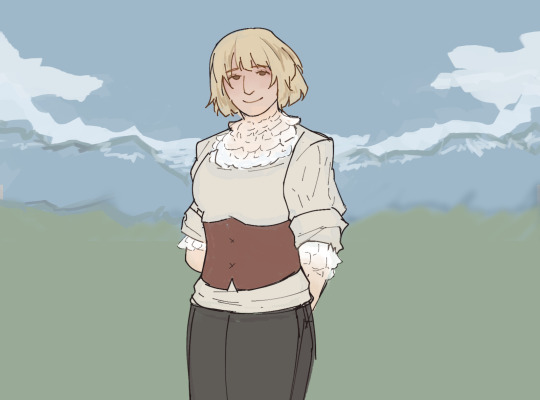
princess for whom the world could be devoured
#Falin Touden#Dungeon Meshi#shoutout to Falin#for being ridiculously my type#I understand everyone whose goals are related to her#I get it#Dungeon Meshi spoilers#my art!#halal thoughts about her only promise
131 notes
·
View notes
Note
There's a thread on the arknights reddit asking why is Eyja so resistant to powercreep. About half the answers were because the devs virtually give no other casters the amount of res ignore she has and she was just made right from the start and casters past her are either meh or Goldenglow.
It's a fun problem to talk about and these answers are correct, but I would argue that fully understanding the issue of Eyjafjalla's effect on Arknights' design and why she's so hard to powercreep comes down to understanding the combination of four things:
Arts damage is calculated by reducing the initial damage by a percentage given by the target's RES
Arknights is a Tower Defense game
Eyjafjalla was first and with a very overloaded S2
Closely related to #3, Arknights is a live service (gacha) game
I'm not sure if I can explain this very cohesively, but I'll try. This is going to be a very long post going over all 4 points in detail, after the cut
I'll go over info you definitely already know to explain Point#1, but please be patient.
Arts damage in Arknights is calculated like how Magic Resistance works in many games—it's reduced by a percentage of the target's RES, vs Physical damage being a flat reduction by DEF or ATK - DEF. Let's explain Physical first.
The flat reduction from DEF means that while Phys damage does almost nothing if it's below an enemy's DEF, slowly slowly increasing the phys damage being outputted will get over the enemy's DEF until it starts being effective. The higher you boost the phys damage over the initial DEF, the more effective the attack becomes. 2000 DEF may be extremely tanky, but if you deal 10,000 damage per hit in one second, you're still dealing 8000 DPS. On the other hand, if you deal 1000 damage per hit 10 times in a single second, you're doing basically nothing (a minimum of 5% damage per hit) to a 2000 DEF target despite having the same DPS.
Meanwhile, Arts damage being reduced by a percentage dictated by enemy RES means that the actual damage per hit doesn't matter. If you make a 10,000 damage Arts attack hit an 80 RES target once per second, you do 2000 DPS. Do the same thing where an attack does 1000 damage Arts hits 10x in 1 second to the same 80 RES target, and you do 200 x 10 or 2000 DPS. This means Arts damage ultimately only cares about DPS, no cares about whether it gains it from boosting ATK or ASPD, it will be the same in the end.
Moving on to Point #2, other games that calculate magic resistance in this way aren't Tower Defenses, but Arknights is. Being a tower defense means that the objective in any stage is to beat all AI enemies in a stage before they finish their set path to your goal, and no matter what strategy you go with the only approach to victory involves killing all enemies in some manner. This foundation means that DPS is inherently king (as in many games, but with Tower Defense's especially), as your only form of gameplay involves destroying the AI enemies with set patterns, everything else only serves that purpose. The hypothetical ultimate Arknights unit is not the one with the best utility or versatility or strategic potential, it's the unit that can kill the most number of enemies onscreen more efficiently than everyone else. So when it comes to units that deal Arts damage, Arts units that can kill the most enemies the most efficiently are the most valuable.
In other games in completely different genres but with the same approach to magic resistance (a very big logical leap I know but hear me out I swear), DPS numbers cannot be the end all-be all. For example, Dota 2's magic resistance works the same way, and they even have heroes with similar approaches to the game, but being a human player vs human player game and actually being unable to win by killing all enemies alone creates nuance.
Lina and Skywrath for (an extremely simplified and obviously overlooking many, many more nuances) example, are both squishy magic damage nukers whose goals are to surprise one enemy and then destroy them as fast as possible with very high magic damage. However, they are usually incomparable, because they're not just fighting set AI enemies walking on pre-determined paths, but human players who will react in different ways to the smallest differences between the two characters (ex: Skywrath has no way to completely stop enemy movement so he'll have a partner nearby to watch out for, Lina has a stun so she's more likely to be alone, but there's no dodging her homing Laguna Blade like you can with Skywrath's ground-targeted Mystic Flare so kill her before she fights back). Also, you can only win in Dota by destroying the enemy's base, so a team with 100 kills can actually lose to a team with 30 kills if the team being beaten up constantly dodges fights but manages to destroy the enemy base still. The ability to kill your enemies must actually be in service of your ability to destroy buildings (which are normally magic immune), meaning a caster that can annihilate enemy players is the blink of an eye but is useless at breaking buildings or defending may become a liability if they don't help their team at pushing faster than the enemy or can't help defend their buildings. To put it short: in other games, the non-linearity of both the objectives and combat encounters means increasing raw magic DPS cannot always be a solution
So now we go into Point#3 and 4, Eyjafjalla was the first 6 star Caster, and Arknights is a live service game meaning it must change over time.
Eyjafjalla having an automatic and powerful skill with RES shred, multiple charges, and even AOE on her S2 spelt doom for the entire Caster class, even more than her infamous S3. With S2, Eyja was cheaper than Casters with AOE, dealt more DPS than them while having their AOE, didn't require any manual input from the player, and even shredded enemy RES.
Now Eyjafjalla's S3 could be competed with, as it was a long cd multitarget DPS skill. Ceobe came with her own machine gun on S2 that could scale off enemy DEF, while Carnelian came with true AOE rather than a 6 target limit (though Eyja's S3 was still better in the end lol). However, her S2 being so easy and so powerful in a tower defense where efficient and strong DPS is the most valuable trait you can possibly have means HyperGryph either have to directly powercreep it with a similar skill, or work around it, which is where Point#4 being closely related comes in.
HG's approach was trying to work around it, which is why other Casters have clearly tried to stay out of her way either via utility or new features. Goldenglow has global range, Ebenholz sacrifices DPS for instant burst (but then eventually got a DPS module anyway), Mostima has big slows, Dusk creates summons to block enemies, etc. But even with all the utility or features being put into other Casters, if Eyjafjalla kills enemies just as quickly and easily as she did at release, then there's no real reason beyond your own fun to use anyone else. Eyja's S2 is still killing everything. That means enemies also have to change.
If Eyjafjalla killing enemies so easily with either S2 or S3 is a problem, then the only solution without being able to nerf her is make enemies harder for her to kill alone. This is why Patriot Phase 1 had 90 RES, so Eyjafjalla couldn't just kill him like she did all other bosses while Amiya's S3 had True Damage. Later enemies would also try other gimmicks, like the enemies in Lonetrail starting with very high DEF and RES that would lower after multiple hits, so strong DPS casters like Eyja can't instantly kill them with S2 (although her S3 will kill them from rapidfire lol).
However, unlike someone like Exusiai who had low ATK but monstrous DPS from multihits and ASPD, simply raising the floor of enemy RES will negatively affect ALL Casters, because of point#1— Arts only cares about DPS because of how it's calculated, damage per hit doesn't really matter. While Exusiai players can still play around with her by attempting to boost her DPH above the enemy's DEF threshold (and run the math on whether they should just try to lower enemy DEF instead), Casters will react the same to boosting ASPD and ATK, while lowering enemy RES will become more and more efficient the higher enemy RES gets, and hey, guess who comes with a RES shred? Eyjafjalla's S2.
Eyjafjalla trapped Hypergryph's design team. Keep raising RES and other Casters quickly become more and more useless without RES ignore / RES shred of their own, becoming a second support class when Supporters already exist for the idea of "Casters but supports". In fact, as RES gets raised, Eyjafjalla and other casters like Ifrit become more and more valuable as DPS units (in a tower defense where DPS is king), since they can ignore / shred RES when most cannot. Keep the game playable for other Casters however, and it means Eyjafjalla will continue to reign supreme.
HG tried to do a balancing act. This is how we got enemies start to get more RES over time, which weakened Casters overall enough that HG made a module for Core Casters to ignore 10 RES (that Eyjafjalla also got LOL). This is also how we got into the current state where Eyjafjalla is still comfortably killing 90% of the game and seen as near impossible to powercreep, because if she can't then people without her (and there WILL be people without her, because it's a gacha game and she's not guaranteed) would be totally screwed. Try to directly powercreep her by making a second Eyjafjalla with bigger numbers, and not only will you be pissing off people that rolled for Eyjafjalla, but you'll be creating an even bigger problem instead of fixing the first one.
So to tie it all together
Point # 1 means that Arts damage is a lot less nuanced than Physical damage, leading to raw DPS by any means coming out on top
Point # 2 means that if the only way to win is to destroy all enemies, then the ability to destroy enemies with damage faster and more effectively will always be the strongest solution
Point # 3 means that since Eyja was first and also very overloaded with features, everyone else was created with the knowledge of that they'll be competing against her, meaning you either had to directly powercreep her, or stay out of her way. HG chose the latter
Point # 4 means that while Arknights tried to address her, by either making tankier enemies or by event game mechanics, they were trapped by their own design. Because of Points #1, #2, nullifying Eyjafjalla too much would be screwing over everyone else because of the end result of Point #3, which is everyone tried to stay out of her lane when it came to DPSing. Not everyone can have Eyjafjalla because it's a gacha game and who you get is all RNG, and while you want new units to be attractive to make money, directly powercreeping old characters screws over your own players and makes them angry, while powercreeping Eyjafjalla directly will not even fix the problems created by points #1 and 2, it just makes an even more problematic, second Eyjafjalla.
Thanks for reading this far! If anything wasn't clear just ask and I'll try to explain it again
227 notes
·
View notes
Text
The RWBY fandoms treatment of Adam makes me very uncomfortable
This is very long sorry I was rambling <3
There’s something really odd about the dedication RWBY fans have to hating Adam. So much so that they’ll admit the writing of the WF is racist but refuse to admit that Adam a member of the white fang also suffered from that racist writing.
There’s this weird dedication to pretending there are no problems with the choices made around Adams character and vilifying literally everyone who tries to talk about it, for the sake of continuing to blindly hate him. The fandom seems to struggle with understanding that the show is fictional and everything that happens in it is a direct choice of its writers. Y’all talk about Adam like he is a real person who has personally offended you irl. Just a huge lack of media literacy tbh.
A white man wrote a civil rights group, that he admittedly based off the black panthers, as the generic bad guys of his shitty anime knockoff and made a central theme of the show the idea that fighting against your oppression violently makes you just as bad if not worse than your oppressors. Then he mad the leader of that group a generic abusive meanie bad guy. Who essentially is what white supremacists think civil rights activist are all the way down to being the fictional equivalent of a black supremacist.
When there was backlash to this he made a knockoff Malcom X and then killed her in her only scene and made a character whose ideology is basically sit down and lick the feet of your oppressors and had the audacity to say he was based off of MLK. How the fuck do you base a character off of somebody without doing basic research on them because contrary to what people seem to believe MLK was not a doormat and this is a conversation for a different day but I’m sick and tired of his memory being weaponised against black people.
What’s worse is that Adam is the only character portrayed as actually doing something to fight racism. Ghira’s faction is only ever seen fighting against other groups. I don’t know if y’all know this but that’s not how the civil rights movement worked. Most of the leaders didn’t agree on methods but they coexisted because the main goal was the liberation of black people and they knew they had to coexist. MLK did not go around calling the cops on revolutionaries he disagreed with.
The problems with Adam and the WF are not separate and cannot be. Most of what’s wrong with the Faunus plot line is the way the show handles Adam. The choices made with his writing cannot be separated from those they made with the WF overall. Adams choice to kill his attackers to keep himself and other Faunus safe, from people literally trying to kill them, is treated the way it is because of the stance they took with WFs writing. When Adam kills a human supremacist trying to kill Ghira you’re supposed to see it as an extreme and the beginning of his turn to evil. Adam isn’t a real person every descisiom he makes is informed by the white writers of the show. Why would the bias they displayed writing the WF not apply to him?
Some of you have been abused and relate to Blake in that sense, a lot of you seem to be projecting your abusers onto Adam. I’m sorry you went through that but you are not excused from buying into racist rhetoric. It’s incredibly uncomfortable as a black person to watch people talk about how “healing” it was for them to watch a civil rights leader admittedly inspired by black people slapped around and killed by two white women. It is anger inducing to watch fans celebrate “queer representation” dancing on the corpse of a monumental disrespect to black people and our history.
RWBY doesn’t even handle abuse well tbh and most of the queer rep is not that great, there are many shows that do it so much better, there is actually no excuse for hanging on to the black people are bad for fighting against racism show.
#before you start no i don’t give a shit about bumblebee#this really isn’t about them#i wouldn’t have had a problem of killing the civil rights leader wasn’t treated as a bee moment#this is probably the only post I’ll make on that show#im going back to strictly reblogs#let’s hope this doesn’t get me death threats#rwde
333 notes
·
View notes
Text
The Record of Stan Frederick: A Study of Amendments
This is an analysis that is long overdue. If there’s anyone in the world that could tell you how much I love The Record of Stan Frederick, it’s my best friend whose ear I’ve talked off endlessly about it, and they would probably tell you that Amendments is not only my favorite episode of the series, but also that it’s my favorite Slenderverse video of all time. If anyone who hasn’t experienced the Slenderverse asked me to show them one video from it that would paint them a picture of what the spirit of this universe is all about, this is the one I would point them to, because its characters, story, and editing encapsulate everything that I’ve loved about the Slenderverse for years all in one episode. I believe that Amendments is not only just a brilliantly made episode among many others in The Record of Stan Frederick, but it is also crucial to our understanding of the narrative, of what both separates and brings together our primary protagonist and antagonist, how the events of each character’s lives and how they felt about them affected their choices, and how the overall story of this series promotes the cautionary tale of not letting yourself fall into perpetuating the cycle of violence.
This is a case study of Amendments.
In the context of The Record of Stan Frederick, the dictionary meaning of the episode’s title would be defined as “a change made by correction, addition, or deletion” as our protagonist Stan Frederick’s goal in this particular video is to correct his error of putting off stopping his ex-partner in crime, Connor Dwight, from hurting the people around Stan when he had known how to stop Connor for at least a year. Stan put everyone else’s monsters ahead of his own, which only led to further destruction that could have been avoided—yet another huge mistake that cost him greatly. With his metaphorical will to live gone when he lost Willow, a child Stan was trying to help who was being hunted by the monsters known as Seedeaters, who manipulated her sister Dana to give her over to them—an event that Connor had a hand in tricking Stan over after being given Willow’s death prophecy by another monster known as the Rake, in which Connor proceeded to give Stan a warning ahead of time that other characters they knew could be the next to die, but never gave Willow’s name as an option—Stan finally worked up the nerve to take care of him once and for all.
Stan returns to his childhood home years after the loss of his little brother Erik and his parents, the place still as empty as it was then, save for the monster who took them all, standing at the top of the stairs waiting for him like it had never left. The Slenderman, as we know him, a monster who Stan used to fear so much and once gave into survival to appease it, and now Stan needs its help. It’s such a cruel twist of fate when he had taken everything from Stan in the past, and he has to question it: Can the monster feel emotions like pain or fear, and do the things that it does mean anything in relation to what it is? The reality of this question is to wonder if this faceless being who never speaks its mind has any level of consciousness humans can understand. Is it just a monster meant to prey on people like an animal for its own survival? Is it meant to play games with the mind until its victims are broken and nothing more? Is it something so far removed from us? Or is it like us at all, able to understand the horrors it puts humanity through, but does it anyway? Could it ever have felt the pain that Stan felt every time it took someone from him, and could it have ever understood him? But they’re questions that never come with an answer. It does what it does and that’s all we know.
But there is one other thing that Stan knows: how to please it. He makes a deal with Slenderman, not a far cry from making a deal with the Devil, that if he would make Connor human again so that he can be killed, Stan would let Slenderman take him in return. Turning the corner up the stairs, Stan finds that Slenderman has disappeared at the request, and at first believes that this was a denial of the offer on the monster’s part, only to look back down the stairs and see him now at the bottom instead. The deal Stan made effectively reversed their roles where Slenderman went from being both literally and metaphorically above him to being below him, showing that Stan now is the one who has control over the monster, it doing his bidding instead of the other way around—a relatively uncommon thing for a protagonist of the Slenderverse to make happen. This is one of the many things that makes The Record of Stan Frederick unique in general, because the story is told from the perspective of someone who has already been through this and knows the monster’s behavioral patterns instead of someone who has never had these experiences before.
With his deal accepted by the monster, Stan enters his old bedroom with only his camera that he sets up on the windowsill, and Connor’s gun. For a moment as he loads the gun, he thinks back on the last conversation he had with his brother Erik the day Slenderman took him, a memory that we as the audience also hear, before putting the gun to his head which lures Connor out. The trigger is pulled and despite the gun being loaded, no bullet comes out, because Stan isn’t allowed to die. The Rake still owes him for having given Connor to him years ago, and Connor can’t kill him because he’s under the Rake’s protection. Similarly, Connor can’t be killed in his current form as what’s known as a corruptelam—an echo of a person much like that of a ghost that can be left behind when a monster consumes a human. So with the two of them now standing face to face, both unable to be killed by the other, they’re finally at a stalemate. This is also reflected in the framing of the scene in which neither character stands above or below the other, showing that they are currently equals, unlike before for example in the episode People where Connor stands over Stan and Serena after fighting them off.
This is when Stan tries to appeal to Connor’s emotions, asking him if he remembers when they first met and saying that he knows Connor forgot a lot of things. It’s unspecified just how much Connor did forget as the type of corruptelams Stan had described the Rake leaving behind being echoes of the body rather than the mind, the type which Connor is, but we do know that day was one of the things he seems to have forgotten. Stan reminds him that they were once just kids in the foster system, both afraid of the same monster and the only ones who seemed to have been followed by it, which is when they clicked. And interestingly enough, for a second, Connor almost seems… sad. He bows his head and stares at the floor, and Stan mirrors the same position. Mirroring someone’s behavior in psychology is often a sign of empathy, giving the other person a non-verbal sign of connection and understanding, and it’s often something subconsciously done in our every day social environments. It shows that both of them are in sync, engaged in the same discussion and nostalgia of the past they endured together.
Stan didn’t know anything about Connor back then, certainly not what he was capable of becoming, but he knew even less about what he himself would become and what they would become together. Fear drove them both to survival, as equally guilty in what they did as they are in their equal inability to die. It’s what they both wanted at one point, to be able to live without that fear. To want to survive is human; when we’re faced with death, most of us will do anything to stop it, just as they did. But sometimes we go about it in a way that brings harm to others. Sometimes we become selfish creatures and throw others to the weeds if it means we’ll get a good night’s sleep. The truth is, the only thing that makes Stan better than Connor here is the fact that he woke up one day and realized he didn’t want to live that way anymore, to hurt others to keep himself safe. They’ve both been victims and they’ve both been perpetrators, but only Stan broke that cycle.
Stan then lifts the gun and points it at Connor, who reminds him that Stan can’t kill him. Stan replies that he knows because Connor is a corruptelam, the phenomena which he had named himself, to which Connor points out that he finds this whole situation embarrassing. This moment and the moment before are so surprisingly human, taking a step back and looking at the portrayal of Connor’s character up until this point as an otherwise threatening and intimidating figure. But, being completely unphased by the gun, Stan wonders if Connor had forgotten that, too—how to be scared, knowing now that he can’t be killed as a corruptelam and feeling that nothing bad would ever happen to him again because he’s something stronger than a human now. This conversation perfectly mirrors Stan’s earlier questions to Slenderman of if he can feel emotions and if the awful things he does have any purpose relative to his being, because Connor has truly become their own monster: perpetuating the cycle of violence, taking what he can from Stan to hurt him, and now unable to die. He’s forgotten the times that he used to lie awake in bed every night, terrified that their monster would come back again and harm him, and that’s something he outright tells Stan. “You move on. You make it better for yourself. You forget!” he argues. “No, you don’t! You don’t forget that,” Stan responds. “I certainly don’t. I forgot a lot… But I would never fucking forget that.”
To remember our fears, in Stan’s eyes, is what keeps us human. It’s what reminds us that other people in our own personal situations have the same feelings as us, and makes us ask what right we have to make them suffer while we find peace. What makes us our monsters is not the hardships we face, but the hell we choose to make others go through to feel better about ourselves, and we have to be careful not to cross that line. We are all as capable of continuing the cycles of torment we experience as we are capable of breaking them, and Connor unfortunately never did.
It’s at this point that Stan allows Slenderman to complete his request, to turn back the clock and make Connor human again. Connor falls to his knees before his monster and screams as Slenderman does this, remaining on his knees even when it’s over and Stan points his gun at the back of Connor’s head. This scene shows that their stalemate has finally been broken with Stan now being above Connor rather than on equal ground with him. Connor begins to make one final plea for his life, but Stan cuts him off by shooting him, ending his life for real this time. Blood covers the screen, hiding Stan’s face from view as he too falls to his knees, now becoming his monster himself. We can no longer see his expressions beyond the blood, we don’t know his exact thoughts, if he feels better for taking Connor out of the world so he can’t hurt anyone else, or if he feels more grief for having to take his life with his own hands this time around—having also been stated in one of the book excerpts to have hated himself for giving Connor over to the Rake originally—or if he’s feeling some strange mixture of both. We don’t know what his emotions are toward that action in that moment, just as we don’t know what Slenderman’s emotions may be when he hurts people, if he even has any at all. There’s only emptiness left in the silent room that we as the audience feel, until Stan leaves Connor’s body behind for the Rake to find and goes back downstairs to accept his fate in giving himself over to Slenderman, completing their arranged deal.
Except he doesn’t.
As Slenderman tries to take him, Stan talks back, explaining how Slenderman used to be so huge and terrifying to him as a kid, and how he took everything from him. He asks the monster then if he really thought that Stan was going to let him take him too before using the same gun he had just killed Connor with to shoot himself, finally able to die as he was no longer in the Rake’s good graces. A body for a body. And not to get all David Kushner’s Daylight here, but that gun, too, is a metaphor for how Stan and Connor drinking poison from the same vine of survival led them both to their deaths. It was Connor who owned the gun first, the person who also initially suggested the idea of sacrificing other kids to their monster in return for their own peace, which Stan agreed to. The blood from the same deal they made was always on both of their hands, but Connor choosing to share that poison with Stan made Stan his own undoing from the beginning as he would always be the one to stop Connor. The awful truth is, if not for Stan, Connor’s way of surviving may have been proven to always work. It’s a horrible way to go, but no one else ever brought him down. If Connor truly wanted to survive in that way, picking Stan as his survival partner was the wrong move, unbeknownst to him at the start. The gun is a symbolic reflection in this scenario of Stan’s original plans when he had initially accepted Connor’s proposal of harvesting—that he was going to poison his and Connor’s cups of coffee which would kill them both, stopping Connor from going through with perpetuating the cycle of violence and ending his own life because he never stopped feeling guilt and grief from losing his brother to Slenderman.
The narrative actively punishes Stan whenever he chooses to live, and fate seems to scream that he has always been meant to die that day with Connor before they could ever do any of the horrible things they did together. Whether that be the time he handed Connor off to the Rake and got to live again only to be stuck trying to make up for their mistakes, or this time in Amendments when Stan returns as a corruptelam for one last try at making something of his life and he loses the last of the people that he loved, it’s always a punishment that he doesn’t die. He committed unforgivable sins that he could find no redemption for unless it was to choose death, and there was never another option to redeem him. The tragedy of The Record of Stan Frederick is like something out of a Shakespearian play, that there is no atonement and no end to Stan’s suffering unless he dies when all he wanted to do before was get out alive—just as his favorite song said. Amendments perfectly conveys the message of this story like no other, that becoming your own monster can only lead you down two paths: one of a never-ending cycle of hurting others to feel better about yourself, or one of never-ending regret. There’s no hope in that cycle. But there is hope in reaching out to others for help when you need it, and that is part of the message, too. After all, it’s Stan who tells his support group in the episode titled Support Group that they have each other and tells them how important that connection is. The support of those going through the same troubles as us is meant to lift us up, to help us survive together in a positive way, not to abuse and exploit it as Stan and Connor once did. It’s up to all of us to decide which path we’ll choose, and it’s up to us alone to accept the responsibility of those actions—just as Stan finally did.
#Stan Frederick#The Record of Stan Frederick#Slenderverse#I've been working on this all afternoon and now I can't see because I've been staring at my screen too long#worth it#I feel like I should have a tag for my analyses and essays at this point but I don't#and here I thought I'd never be writing essays again after high school but apparently I'm neurodivergent about fiction so here we are
27 notes
·
View notes
Text
"Out of time" - Appreciation post for Li Susu portrayed by Bai Lu


Out of time: Traumatized Time Traveler
Li Susu is chosen by fate, time and birthright to fight the Devil God. She has bravely faced him to protect her family, her sect and her world - and lost them all in the blink of a (red, sexy) eye. Travelling 500 years into the past to prevent the rise of the Devil God has left her traumatised and overwhelmed. On top of that, she has to find her way into Ye Xiwu's life, which has left her a mess.
Through it all, Li Susu never loses her distinctive personality. She has a strong moral compass, cares and loves easily. Within a few weeks, she reciprocates the love of Ye Xiwu's family and, according to Bai Lu, develops feelings for Tantai Jin's relative early on. She is also cheerful, cheeky and stubborn, but also smart and modest. This is where Bai Lu's charisma, chemistry and comic timing really shine.
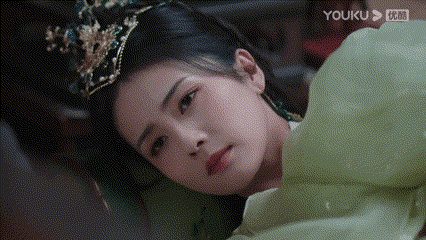
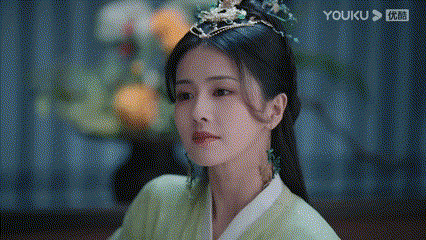
As an audience, we see the world through her eyes. I have seen complaints about her early behaviour - described as cruel and contradictory towards Tantai Jin. It seems that one thing that divides the audience of Till The End Of The Moon isn't simply their opinion of Ye Xiwu early on, but rather the ability to emphasize with her character and behaviour. It seems that some people fail to understand her complexity. She is not mean or vengeful, she is overwhelmed and traumatised. Li Susu struggles to find the right path between her own morality, her developing feelings for Tantai Jin and her mission. I find this inner conflict fascinating and well portrayed by Bai Lu. She doesn't act in a logical way - but how could she do such a thing given the extraordinary circumstances she faces? I think the inner logic of her character is coherent.
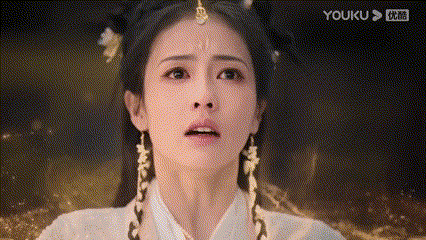

Her introduction as the main character is well done, both in terms of writing and acting. We meet her at one of the worst moments of her life, which gives Bai Lu a chance to show off her acting skills right away. For me, a lot of dramas lack compelling female leads, especially before the character development unfolds, so seeing Li Susu's emotional turmoil in the first episode gave her depth and range from the start.
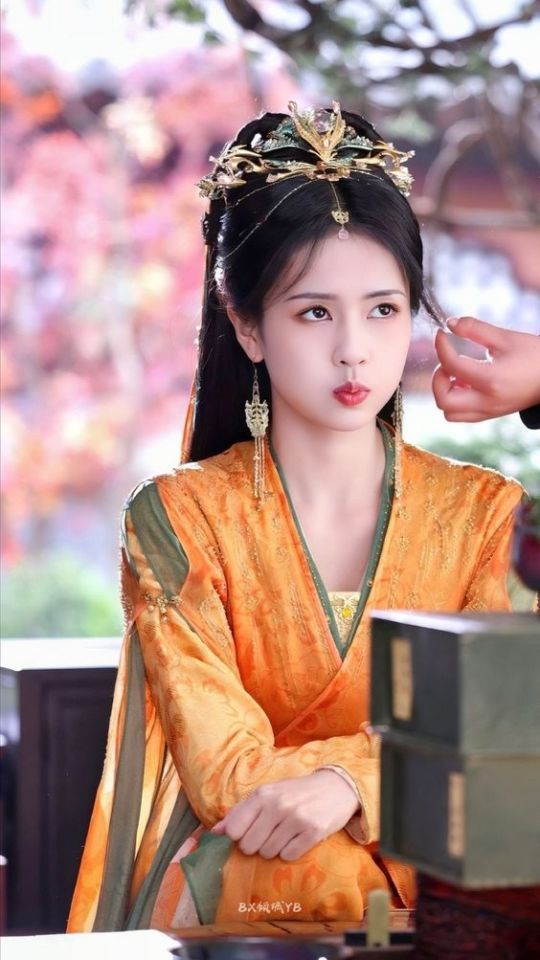
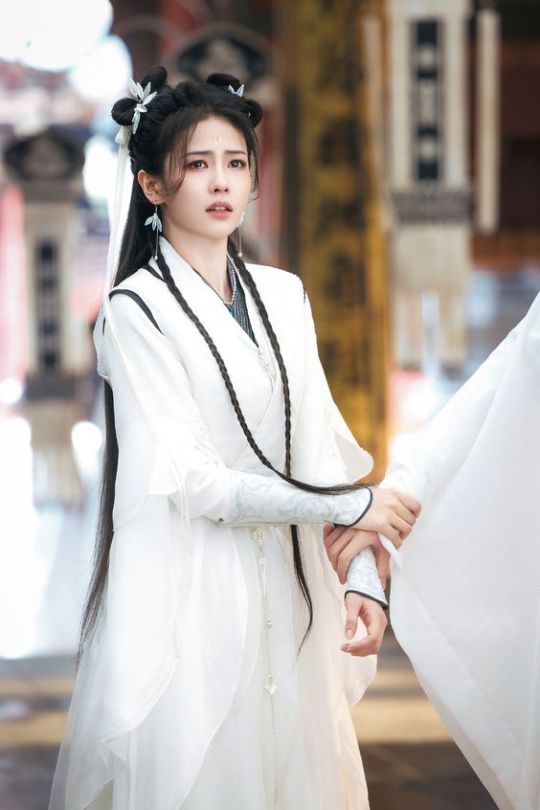
Out of time with the society around her
There is another meaning of the phrase "out of time" which I think fits Li Susu quite well: In the musical sense, it means "not in accordance with the appropriate musical rhythm or tempo". It refers to her not dancing to the same beat as everyone else around her. This is not only because of the time travel, but also because of her upbringing as an immortal "pure spirit body" in an isolated sect. This position as an outsider makes her a more relatable character to modern audiences.
Li Susu doesn't fit into the social and gender roles of her new era. Like the century-old demon Pianran, she defies these norms. She is free-spirited but righteous, conflicted but persevering.
The show challenges us to root for more multiple characters whose goals are at odds with each other. And if the audience is able to keep track of these different perspectives, and keep up with the tension of the resulting contradictions, the plot becomes a nuanced and complex story about the greater good of the world as well as the struggle to control one's own destiny.
I found Li Susu very likeable and enjoyed her journey through three arcs. However, I regret that the last arc was cut and that her character development was not allowed to fully unfold.
Out of time in her relationship with Tantai Jin
Li Susu and Tantai Jin are out of time in every sense of the phrase. As they travel through three arcs, three worlds and two lifetimes, they are never quite on the same page, never quite in sync.
In the first arc, Li Susu hides her true intentions and can therefore never fully reciprocate Tantai Jin's feelings. Tantai Jin then spends 500 years desperately searching for a spirit whose real name he doesn't even know.
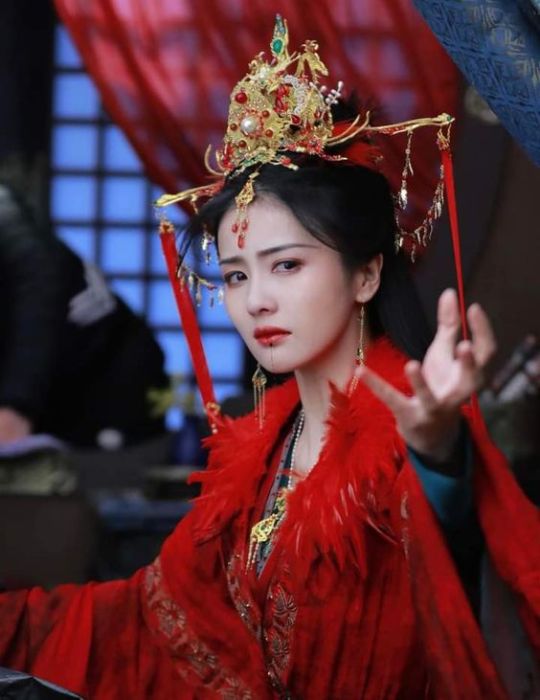

In the final arc, Li Susu tries to move on from Tantai Jin while he still tries to resurrect Ye Xiwu. Once reunited, she tries to peruse the Heartless Way to seal the evil bone, while he tries to win her back.
They only get into rhythm for a brief moment after their betrothal before they are separated in preparation for their wedding.
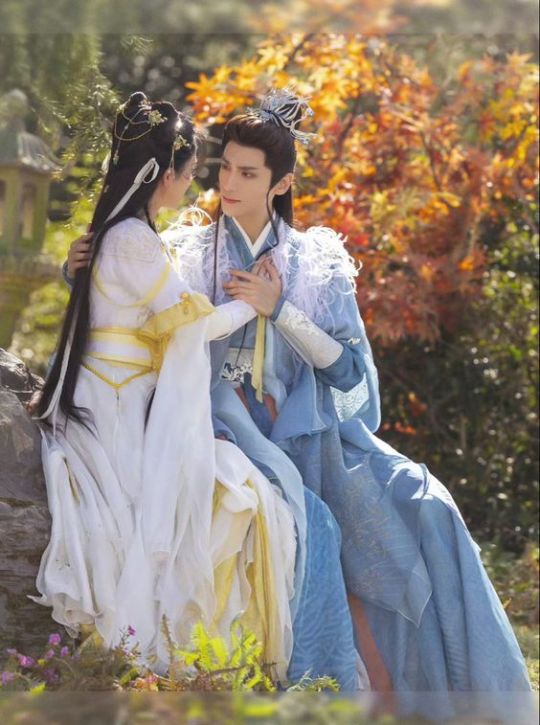
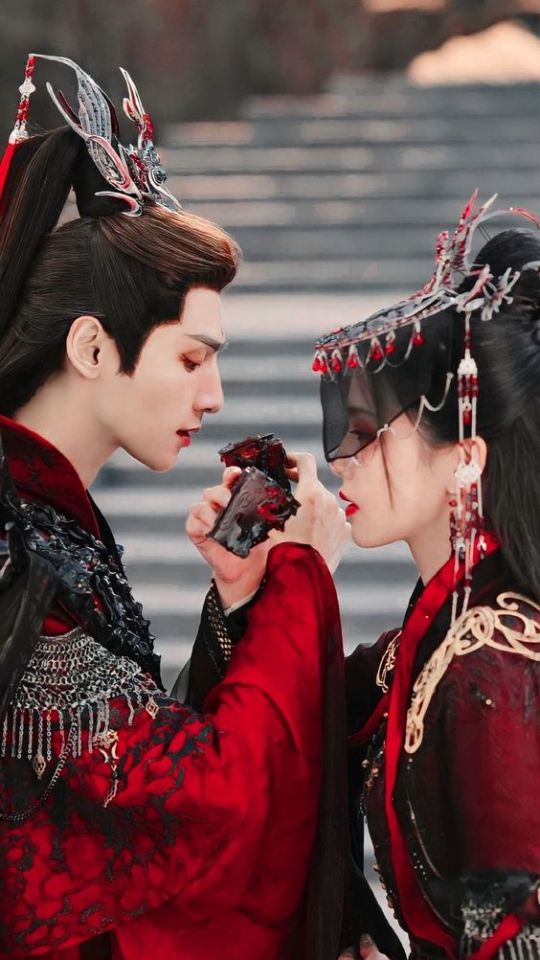
In the final episodes, their initial roles are reversed, with Tantai Jin hiding his true intentions for the greater good and lying to Li Susu. He is running out of time to let her ascend to godhood and stop the All-in-Distress Way before it destroys everything. Even as gods, they are still not on the same page, as Tantai Jin denies her the choice to follow him into death and rebirth, instead tricking her into living on alone.
Nothing symbolises this theme better than the final scenes at their graves: visiting them and mourning each other at different times, never to be reunited again. This scene is so heartbreaking that even after watching the show four times, I still can't make GIFs of it because it makes me cry.


Never out of place: Bai Lu's acting
Bai Lu's acting is another highlight of the show. While her chemistry with Luo Yunxi is well documented, she actually manages to have great (non-romantic) chemistry with the entire cast. Their relationships always feel ingenious and alive. Between Luo Yunxi and Bai Lu, the showrunners have managed to hire four very impressive and emotional eyebrows!

Bai Lu's facial expressions are always on point and elevate her scenes. While her approach to comedy involves exaggerated facial expressions, in more serious moments she is able to portray many different emotions at once without it feeling out of place.
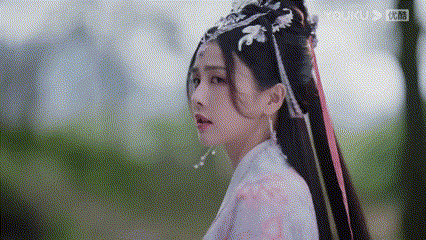
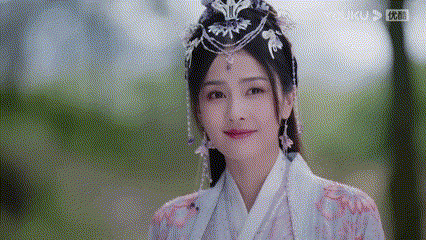
I have talked a lot about Luo Yunxi's acting in the show, but I think Bai Lu deserves a lot of credit for her role beyond their chemistry. She is such a joy to watch on screen! From funny to heart-wrenchingly sad, she made me go through so many emotions and tissues. To be able to touch the audience in such a profound way is the highest compliment I can give her!
Behind the scenes, Bai Lu is a vibrant and dedicated person who gives her best to every scene: Be it immersing herself in mentally demanding or physically exhausting scenes. I'm looking forward to getting to know more of her acting.
Edit: Spelling!
128 notes
·
View notes
Text
Study of Source of Ketu's Struggles Mylène Farmer - Désenchantée

A famous popular French - language song from the 90s by a Franco-Canadian (hello fellow Quebecoise) singer, who according has Rahu in Magha Nakshatra closing in on her Lagna, reveals the feeling and thinking process of Ketu influenced natives, that leads to their suffering. This text can be especially relatable to you if Ketu in your chart is in conjunction with a planet, placed in an angular house 1, 4, 7, 10 or if your chart has any of the Ketu ruled Nakshatras, Ashwini, Magha and Mula.
For those who are relatively new to Vedic concepts, before I start bringing up relevant lines from the song, first a reminder that Ketu just like Rahu, is a Node of the Moon. The Moon is childlike and reactive. Moon is the most biased, personal planet, responsible for our unstable emotional patterns, our sensitivity and response to the environment. Rahu and Ketu are two Eclipse points opposite each other, where at the moment of our birth, the consciousness is the most foggy, and thus prone to confusion that breeds fear, paranoia, obsession or disillusionment. While Rahu is the energy that clings and devours out of fear, Ketu is the energy that moves away and lets go out of hopelessness. Of course, these sentiments are purely subjective regurgitations of our subconscious beliefs rooted in early childhood, which can be reprogrammed, but anyone who tried training their subconscious mind and facing their deepest fears knows it is not easy and takes a lifetime.
The erroneous belief that somebody else can save us from ourselves and our own head, mixed with extreme sensitivity and blaming our internal suffering on the external world. Feeling lost in society.
"Whose hand should I hold onto?"
"I'm looking for a soul that could help me."
"Who can pretend to cradle me, who can give me something nourishing I can devote myself to?"
"Who can stop me from hearing everything I hear when my reason collapses?"
The answer to these questions is, nobody. Every human being in the world suffers from their own struggle, and that is our point of connection. We are all a hero of our own story, and some stories have similar battles, but we all ultimately fight our own. All these questions are driven by Ketu, the illusion of clinging to safety. Most importantly, these lines show that deep down there is an awareness, that all we are looking for here is an illusion ("who can PRETEND to make me feel safe") but in our despair, we don't care, because we want to experience a feeling of relief....based on whatever was programmed in our subconscious mind in childhood.
This error of perception is probably the number one cause of suffering for both Nodes. Moon rules self awareness and self soothing, thus such as its goal, as is the goal of the Nodes. But the Nodes, being the most troubled points in our minds, attach specifically to the darkest parts of our psyche, looking for that soothing in confused ways, while a healthy Moon as a planet provides sources for real, tangible emotional relief. While fundamentally the pain we experienced in the past that formed the Nodal emotional distortion was caused by our interactions with other people, we would waste our time eternally clinging to solely blaming those who hurt us, who might even be dead by the time we reach adulthood. We see that more and more, after we grow up, leave whatever hurt us in our primary environment and attract 10 boyfriends in a row that are toxic just like daddy was. By this point the toxicity is not external, it is deeply rooted within us.
Of course we need to be conscious of who caused what sort of imbalance in our psyche, and how they provoked us to feel and react, for the sake of understanding of cause and consequence, and we need to make space for processing our anger, but staying stuck internally forever pointing fingers at everyone else, even if they are to blame, isn't going to get anyone anywhere. At the end of the day, we are responsible for out own peace of mind, simply because no one can enter our heads and fix how we feel for us. Even if we have external help, no one can help us if we don't have the will to help ourselves. Ketu seeks that support through clinging, while Rahu seeks connection through rebelling and getting support for their eccentricity, but both still very much view these behaviours as solutions, projecting their internal struggles into the external world and seeking validation from it.
A person suffering from Nodal affliction may say or feel:
"There is something wrong with the world"
"There is something wrong with society"
"The world doesn't support me as it should"
"I am from a disillusioned generation" = this generation doesn't hold anything of value for me when it should
"These [specific people] should absolutely do this for me now and I won't do anything to move my life forward until they do"
And all of these notions are a sign of lack of understanding, that external things come to us in the form they're meant to, not in the precise form we demand, and the best thing we can do is surrender and let time do its work in completing for us what we can't do ourselves. Which is why Saturn exalts in the 7th house of the Other that is not Ourselves, and why Saturn and Ketu are enemies, since Ketu's primal clinginess and anxiety struggles under Saturn's pressure to develop spiritual surrender.
2. Hopelessness, disillusionment, pessimism, lack of faith in experiencing new things and sensations, lack of desire to improve circumstances, inherently negative belief in only "lesser evil" but no positives.
"Waiting right here [in the same bad spot] for the end"
"Floating in overly heavy air of almost nothingness"
"If I have to fall, at least let it be slow"
"Everything is chaos, where next to my ideas lie their crushed phrasings"
"If there is a possibility of Hell in contrast to Heaven, Heaven can wait for me"
Ketu finds safety by giving up , but not because it doesn't care. It gives up because it cares so much it can't bear the possibility of loss. It can't take failure...because it threatens the illusion of having an absolute safe point within this Universe. As a result, it disconnects from everything that might be potentially risky...and since Existence itself contains a fundamental element of risk, Ketu finds itself stuck in a void of its own making, cutting itself off from everything out of fear.
Reality is, in order to even have a chance of obtaining Heaven, you have to risk Hell. Reality is, life is neither, but our head makes it a mix of both...when life simply IS, steadfast in its simplicity of existence with no judgment . The Node's compulsion struggles with that objectivity, instinctively approaching every situation with judgment based on their false safety paradigms of either instant attack or instant withdrawal.
3. Controlling nature mixed with attempts at predicting every possible outcome, feeling like we can see everything coming. Feeling numb as a coping mechanism.
"Swimming in troubled waters of [potential most probably fake lol] scenarios of [infinite possible combinations we imagine] of tomorrows"
"I only found rest in indifference"
"Nothing makes sense and Nothing goes well"
"If Death is a mystery, There is nothing to hold onto in Life" [because who knows if there is anything after death. Can't control it now so must fear it lol]
Because of its obsessive perfectionism, Ketu ultimately erodes the good things that might have otherwise manifested on its path. Ketu pretends to surrender...but in reality, it's like Novocaine. It's like an anaesthetic drug...from which you eventually have to wake up from. Everything about it is an attempt to spin in its own illusion, replaying the same controlled motion picture over and over, and living within it, not letting anything take us out of that narrow, suffocating space. It is adept at using its own skill and control mastery against our own well being...to lie to itself, using past as false proof, while in fact it takes so much more than cynicism to gain actual bigger picture understanding of life.
Bonus: The Moon's and Node's fundamental desire to return to a blissful childhood state. "I would like to rediscover innocence". Just like Rahu, Ketu wants Jupiter. An all powerful parent, that can make it experience innocence, one last time, even if we know it's a lie, and we can never truly be completely carefree, because even if we had the healthiest parents in the world, they are ultimately also human and flawed, so the notion of being completely cared for through their presence doesn’t exist and never did, so our idea of an innocent point to return to is false.
But if we never really were carefree to begin with, in this Universe of paradoxes that means we actually always fundamentally are. And that realization is the point where Ketu finds its liberation.
65 notes
·
View notes
Note
Are you still accepting asks about late stage DID recovery? I (host of a DID system in more early to mid stage recovery) have some questions about it, if you're comfortable answering (some of them might be too personal and I understand that).
What is communication like when you're Fei? Like, can you still feel and talk to yourselves as distinct? For example say one of you gets anxious about something, can you pinpoint "this is who is feeling anxious" and talk to them to reassure them, or does it feel like ALL of you are anxious and it's just everybody's feeling all at once, and talking to them feels like self-talk?
Do any of you (especially those who have tended to be more different from the rest of the system) feel like you've lost any of yourself and the things that make you you, when you're fused?
Especially regarding #1, do you know how your experience compares to people who say they've reached final fusion? Like other than it being temporary, is there anything that makes it distinct? And same question for functional multiplicity I guess.
Do you/any of you ever get scared/worried about the possibility of someday not being able to separate or even not being able to identify yourselves as separate consciousnesses? And if no, is that because you don't see that as possible for you, because even if it did happen it wouldn't scare you, or both?
There are a couple of vloggers with DID whose content we've been watching since pretty early into our diagnosis because it was comforting to us to see systems who could put words to things we had experienced and show us that things might not always be as hard as they were in those early days of system awareness. But one of them has just unexpectedly had her whole entire system fuse together in the span of like 2 months, despite that she wasn't aiming for final fusion (she didn't have a specific goal picked out as far as that)... and the other is coming back from hiatus and shared that they had a fusion that none of the system, including BOTH the alters who fused together, had wanted. And hearing those things freaked us out.
We're just now at a point of feeling like most of us know who we are, most of us can trust that the rest of the system has each other's backs, that kind of thing. For many of us, we can love ourselves as a whole (the way we exist right now though, a fragmented whole) and as individual consciousnesses, and we love each other like family.
But every single aspect of who we are as "people," how we function in the world together as a "whole person," how we communicate and relate to one another... every single thing about it would change if we fused, you know? I know people say that you don't lose anything or anyone when a fusion happens, but the fact is, no one involved in the fusion exists in the same way they used to anymore after it happens. (Or so my understanding of it is.) And that's a very scary and painful thing to think about for us right now.
I feel like 90% of the time, our communication and teamwork goes so smoothly. I wouldn't say we're close to functional multiplicity, because there are still a number of us who have little to no communication with each other (and I know I'm still not even aware of everyone in the system), but we're finally at a point of feeling stronger together, caring about each other, most of us trusting each other to have our backs, and that kind of thing. And hearing other systems talk about unexpected -- and especially unwanted -- fusions, well... yeah. That scares me.
If we ever reach a point where fusion feels natural and like something we want, we're trying to stay open to the idea of that and we think we'd accept it at that point. But we absolutely would want it to be something that we got to choose, and that happened because we wanted it to happen. You know? The idea that if we process through our trauma and keep working together well, that one day we might just... fuse without wanting to or deciding to... it freaks me out.
Thank you for bearing with this long message lol.
Ayeee Im gonna reply as I read this (I skimmed the first half and decided Id just write as I read); so keep that in context when reading my reply.
What is communication like when you're Fei?
So we actually went on a small tangent below the cut in this post about it cause we were thinking about it as Fei and found it interesting when we paid more attention to how we communicate. But generally when we are Fei we just kinda don't *need* to explicitly communicate or rather, in other terms, focus on paying attention to the communication we are having internally. A lot of it happens smoothly and fast to where a lot of the time it just kinda floats in our head quietly and passes through while we are acting and thus we don't always fully actively attend to the back and forth. As a result, if we aren't meaning to pay attention to it, it often gets kind of "brushed over" in how we internally interpret the communication to be kind of summarized in a more singular identity than specifically paying attention to which part is saying what.
The underlying conversation between parts is still there and if I reflect back and focus more into what was going on in my head, I can absolutely identify the individual parts and the interactions and even BE the individual parts, but usually - when I'm not intentionally looking closely at my thoughts - it's just "Oh I don't want to do that, but you know, I DO want to do that and I could do it better if I was in more of a [part] headspace so I'll let that part win over and so now I do want to do that" when underneath it there was a lot of banter between the "dominant" part at the time (in the post above, Riku) and the other part that would be better to have (in the post above, Chunn). It's only when I actively double took my own thoughts did I go "hey wait a minute that was a funny banter"
Like, can you still feel and talk to yourselves as distinct?
Yeah sometimes. A lot of the time unless something particularly comes up or sparks the interest of a specific part, usually we just kind of exist as a whole, but the second anything interesting comes up, parts tend to rear their head and blabber like they want. It doesn't usually feel as intensely like a whole separate part necessarily, but the distinction is pretty clear even then and its kinda funny as Fei sometimes cause I'm like "Lol [part brain] and [other part brain] are bantering". It's kinda like having mixed feelings I think but with a lot more respect to the complexities, identities, and histories that back the sources of those mixed feelings. I can hear and watch and feel and talk with the parts of myself that generate the mixed feelings and even see and visualize them without them Not Being Me. I am Chunn, I am Riku, I am XIV, I am Ray, I am all of them all at once but also at the same time, I could very easily just choose to be just one of them if I wanted because in the end, they're all me.
For example say one of you gets anxious about something, can you pinpoint "this is who is feeling anxious" and talk to them to reassure them, or does it feel like ALL of you are anxious and it's just everybody's feeling all at once, and talking to them feels like self-talk?
Yes to both. It's kind of hard to explain how it is Both, but firstly, absolutely we almost always can tell which part is feeling anxious as a whole and usually other parts do step in to help lessen their anxiety and help them soothe and talk through it 100%. If I didn't have that I would loose my mind and that is unironically coming from all of our parts. At this point basically everyone in our system is so deeply supportive and looking out for one another and it's really the only way a lot of us have been able to find any peace with how each individual part tends to be such a huge extreme and prone to bouts of really bad self care or maladaptive behavior when left on their own. So we really rely on each other to call each other out, support each other, step in when a part is struggling and cover for one another. Even as a unified whole, its very essential to be looking out for one another and being diligent over eachother's needs - it just kind of comes from a much "higher up" kind of eagle-view lens than a 'on the ground lens' for a lack of better words.
We keep an eye out for each other through a sort of collective lens rather than independently from disconnected views. And so we do notice when one part is agitated or on their shit and usually we can shift around parts to support and help regulate that part as they need. And we do still talk out loud, and it is both to ourselves and to the part at the same time and it feels both like self-soothing and like soothing another person and like being soothed by another person. The best thing is that you get both the joy and dopamine of being a supportive person for someone you care about AND the warmth and dopamine of being supported by someone you care about at the same time.
I never feel alone with myself.
Do any of you (especially those who have tended to be more different from the rest of the system) feel like you've lost any of yourself and the things that make you you, when you're fused?
Naaaah. We have the side system that is usually sleeping both when we are a whole and when we aren't that does sometimes - when fronting - feel out of place a bit because our life is not as centered around those parts being largely engaged parts of ourselves but even they wouldn't say they are "lost" at all
I mean to some degree, it might be somewhat because we are buddhist and don't really believe in the "concept of self / I / me" and don't really define ourselves in any way other than "whatever I am right now", but we just get to do and be everything all at once. Everyone is still here and everyone here can really just become the prominent part or even a completely dominant part and they will be 100% in their natural glory. Riku's disgusting optimism and stubbornness is still here. XIV's loud and obtuse opinionated ass is here. Chunn's "what do you mean you don't do weed you act stoned 24/7" headass is here. Lucille's lack of ability to respond to a tease in a way that doesn't make it funnier is still here. It's just kinda like we can just toggle whats expressed the most at any time.
Especially regarding #1, do you know how your experience compares to people who say they've reached final fusion? Like other than it being temporary, is there anything that makes it distinct? And same question for functional multiplicity I guess.
From what I've heard its actually pretty similar? It's pretty hard to tell what with how complex internal experiences are and how you can only really communicate them through the limited confines of human speech and language, but from what I've read it seems to be pretty common with a lot of people who have reached final fusion.
I do think our perspective on self and life has a large impact on how we like to perceive and operate ourself because - between being AAPI and a buddhist - we have a very very very low value and concern for the concept of identity and individuality and largely do embrace a very fluid, open and ever changing idea of self. As part of our own life perspective and self care and practice, we do actively put effort to removing the concept of "I" and individualism from our lives because we find it just tends to cause more stress than its worth (and also play into the hands of capitalism and just a lot of things we hate about Western American society but I am gonna SMOTHER the XIV brain that wants to go off on that because its NOT the point of this post) so in THAT sense
I do think there is an element of "uniqueness" to the way we operate due to our very core value for fluidity, removal of the concept of "I", and active intent to practice appreciating and enjoying the world as parts of a whole not only in terms of DID but as a part of the world. The way we interact with our DID is about the same way we like to interact with the world and try to interact with the people in our lives, so those sorts of things are non-negligible aspects of how final fusion and functional multiplicity work for us compared to others that might not have as much of an approach to life.
At the core I think it's basically the same, we just enjoy a different perspective in life that tends to also reflect a lot in how we experience ourselves and our symptoms.
Do you/any of you ever get scared/worried about the possibility of someday not being able to separate or even not being able to identify yourselves as separate consciousnesses? And if no, is that because you don't see that as possible for you, because even if it did happen it wouldn't scare you, or both?
Before? Absolutely. Especially when we were first figuring it out and trying to learn how to hold Fei longer AND willingly re-seperate if we wanted to. It was actually absolutely terrifying at first because we had spent our whole life being specific parts and a lot of us were kind of terrified on what it would be like if anything got botched or screwed up or if only some parts fused and others didn't and it ruined the stability and synergies we had built up and god, the anxiety and catastrophization of it all is endless.
It used to be TERRIFYING and there were times we struggled to re-seperate when we wanted to (ironically in periods of high stress a lot of the time) and it did cause us some distress, but over time we kind of learned to just... relax and stop worrying as much about it and just trust in ourselves - more specifically ourselves as Fei. Cause I think in some way or form, us being anxious about not being able to re-divide kind of made us panic throw up partial walls between each other which did seperate us SOME but more than anything just made it harder to fluidly flow between parts which then resulted in us just getting stuck with one-part-dominant Fei. Which is what sometimes caused what we would call "fused-stuck" which feels a lot like being front stuck, but as a fused whole when you can't really properly utelize the other parts you are fused with. It was HORRIBLE, I hated it, but kinda like being frontstuck it passes with time and we just kinda had to go "this too will pass and we will eventually be able to regain our fluidity" and lo and behold, eventually we did gain that fluidity back as well as the ability to just be one specific part should we really want to.
That said, these days? No not really. To some level, yeah it is because I don't think it would really scare us much these days. I don't really necessarily like the idea of being forever fused, but I wouldn't really say it 'scares' us to think about it. Eh maybe a bit from certain parts, cause like right now like maybe 80% of my brain is "ehhh itd suck but itd be fine" and like 20% goes "uhhhh actually" and like at least the Riku part in our brain is going "UHH" so... XD
But even then, that's just when we think about it too long cause certain parts are prone to catastrophizing and thinking about all the horrible ways that could go whereas us - as a whole - are a little better at acknowledging the unforseeable benefits that could also come from it.
For the most part though, the reason it's a "no" is just cause we really just... don't think about it. It's not really something on the forefront of our mind or even like, the middlefront of it. We have a lot of things going on in our life and a lot of things we enjoy and things we enjoy a lot less but are important and it just... doesn't occur to us 98% of the days anymore.
I know people say that you don't lose anything or anyone when a fusion happens, but the fact is, no one involved in the fusion exists in the same way they used to anymore after it happens. (Or so my understanding of it is.) And that's a very scary and painful thing to think about for us right now.
Eh, yes and no - at least in my experience. It's less about parts being the same way or not the same way as they were before in any real way of "morphing" or changing or anything like that and a lot more of just... existing in a wider lens. Kinda think of it like a really detailed painting of sorts. When you are individual parts dissociated from eachother, you can look really really closely at a specific aspect of the art. You can look at how the artist used brush strokes on the specific flower and the hues and you can really appreciate that very close and specific view. Sometimes you can look at another part really closely and remember what the other corner looked like and there is a lot of deep and intricate analysis and appreciation that can come from those close views. The issue is, with those really close up views, its hard to appreciate both simultaneously and even more harder to appreciate MULTIPLE pieces simultaneously let alone appreciate the art as a whole.
And so for me, fusion is just kind of like stepping away and putting the microscope away and just taking in the complex art and painting as a whole. You can survey and focus - from a distance - at any specific part and you can quickly change between each aspect, compare and contrast them, analyze how the parts of the painting play into an overall narrative and how the styles and ways the art is drawn may reflect upon one another. Every individual part is still there and the comparisons and analysis can still be made from a distance. You just get to see more
And in my experience, sometimes I REALLY just wanna study that flower and how that flower was painted alone, because sometimes that very specific very close up very detailed understanding of a specific part of the art is better than just gazing at the whole thing. And that's the great thing. I can always just pull my microscope back out and hone back in.
Stepping away from the painting and getting a wider view doesn't mean that the flower that was otherwise zoomed in on is suddenly inaccessible.
And I guess the analogy doesn't work perfectly because in practice, sometimes interactions between parts may change other parts but 1) is that not just part of life and living in a social world? People come and go and everyone leaves a little part of themselves with everyone they interact with. Change is inevitable and a beautiful and important part of life and 2) even within the analogy, when you understand more of the full picture, sometimes your understanding of the flower alone will change, and that's okay because the flower is still them. Your understanding just became more complex
That said, I absolutely do still understand the fear and pain from the idea of it. Change is frightening, especially with a history of trauma and especially when you have found peace and safety within the parts in your system. I don't want to invalidate that at all cause yeah, absolutely been there and its horribly terrifying. I've just been doing this for a minute and over time I've just kind of learned to trust that no matter what form and opinions any of the parts have and no matter how they change, all these guys are never not going to be the people I need in my life and they are always going to be there for me, when I need them in the way I need them.
They're always going to be them and I'm gonna ride or die with these assholes so, fuck it man. If they turn into a 20ft tall tarantula tomorrow or a worm, I'd still love them and trust that even as a worm they'd still ride or die to support me.
If we ever reach a point where fusion feels natural and like something we want, we're trying to stay open to the idea of that and we think we'd accept it at that point. But we absolutely would want it to be something that we got to choose, and that happened because we wanted it to happen. You know? The idea that if we process through our trauma and keep working together well, that one day we might just... fuse without wanting to or deciding to... it freaks me out.
Yeah thats a completely fair and valid place to be and honestly where we were for years of our healing journey. I think the most anyone can do with something that feels terrifying and is a bit unnatural / untrue to how they currently feel in life is to ask themselves to TRY to be open to an idea. There's nothing wrong with acknowledging that currently it scares you and that currently its not something you are ACTUALLY open to the thought of cause thats fine and fair. Being scared, being not ready, and being unable to genuinely consider it are all completely normal feelings and feelings can't really be forced to change or appear in a specific way. Recovery is a huge and long journey and as much as everyone would love for things to just "be right" and have the "healthy mindset", that stuff takes time to authentically and genuinely develop. As long as there is a slightly creaked open door to be willing to let new experiences naturally flow in, I'm sure you'll get to a place that is healthy, happy and comfortable for you.
Whether or not that is final fusion, functional multiplicity, wishiwashi, or something completely out there beyond my fathoming is far beyond anything I could say cause recovery can take you wild places with it's ways of getting you to a place that makes you happy, but whatever form it takes, you'll get there. It might suck and struggle and be scary at times, but you'll get there - just don't judge yourself for not being able to fit into a specific direction or specific way of thinking or fitting into some standards.
Follow your authentic self and expression and I'm sure you'll find what works for you and what is right for you, even among the chaos. ^^
Anywayyyys, that's another long post to reply to your long ask XD It was a nice chat and ramble so thanks for the ask. I kinda like talking about this stuff so its much appreciated
PS: I will almost* never complain about a long ask, anyone that following this blog knows I post replies that are like 10 pages long for a question like "do you like cheese" because I go on so many tangents and have a lot of thoughts on everything and just like Thinking About Things.
(* = I do not wish to underestimate the power of weird tumblr users /neutral)
#alter: fei#final fusion#functional multiplicity#wishiwashi recovery#ask#asks#did#actuallydid#dissociative identity disorder#long post#i rarely tag that#but between the ask and my response#it is a LONG post
19 notes
·
View notes
Note
⭐⭐⭐ give me that directors infodump 👀
Hehehe I'll give my director's cut on Futaba's awakening!
So I am super in love with the day Persona 3 did their second awakenings. The idea that events in the characters' lives independent from the protagonist caused a shift in their psyche that caused them to develop as characters was appealing for me. Without Ren as the driving force behind the change, they had to change on their own which led me to try to brainstorm what events might push different characters to the brink.
For Makoto it was having everything about the police and justice stripped away with both her own actions, the actions of her sister and how it all culminated into getting a full view of what the justice system she craved to belong to can do to those with no power to do otherwise, it changed her in a way that she can't come. back from. That in my eyes, was the tamest of the bunch.
Then we had Akechi, someone who, at every turn, refused to free himself from his own mental shackles of the situation he's been in. How he viewed his mother and her complicated life. How he viewed himself in relation to his father and in relation to the world. He never really went after what HE wanted, only what he thought was what he was destined to do. To him, finding meaning in life meant finding some sort of balance that would be worth the cost of his mother's life. Bringing down Shido was that for him. A monster through and through and just like the stories and legends that Akechi is no doubt familiar with, that kind of karmic justice may not be "worth" his mother's life, but it's worth his. It's penance for what she had to go through. He wasn't living for himself, not really.
There's a saying in Naruto that really spoke to how I developed Ren and Goro in this fic. Sasuke said Naruto couldn't understand him because he's been alone from the very beginning vs Sasuke who lost everyone he loved. Those are two very different types of loneliness and two different sources of anger that feel like they should be the same, but they aren't. Fundamentally, they aren't, and that's why Ren was unable to reach him in that way.
From the very beginning, I knew Futaba and Cog Akechi were going to be the mechanism for Goro's second awakening. Goro's ultimate villain after all isn't fully Shido, it's always been himself. His perception of himself, his past, his inability to let himself have that love and adoration he craves now that he's found it. The person who could reach him was the only other person who would understand his very unique brand of pain in Futaba.
Being told it wasn't his fault his mom killed herself from someone that in his eyes, has every reason to despise him, to curse him, to see him fall, meant something to him. It reached him in a way that Ren couldn't in this side of the fic because Goro never tried to kill Ren. Not really, but he did ruin Futaba's life in the exact same way that his was ruined. That's why Futaba was the only one who could reach him.
She knows what it's like to believe and be told by others that your life was a burden on your mother, that self hatred, that hatred for the world at large, that need and desire for some sort of justice for your mother. Futaba gets all of that and she says as much in the game. She doesn't have to forgive him, but she can give him what he needs, and show him first hand, in action, that love is complicated.
As for Futaba's awakening, considering the deadly sin being explored in the palace was pride, neither Ren nor Goro was wholly equipped to deal with the palace at large.
They both wanted different things and were reluctant in their own ways to compromise the whole way through. It wasn't until both of them learned that they needed other people- that they could get saved by the person whose shown the most humility in the story thus far, Futaba.
Humility can be defined as having a realistic view of yourself and self-importance. Goro and Ren both put their goals above others, repeatedly.
Futaba is one of the few people in the story who never tries to sacrifice those around her for herself. When given the option to abandon Makoto to save herself when Goro takes everyone hostage, she rejects that. When given the choice to leave Goro to Cog Goro, she rejects that too. She stands up for Ren against the phantom thieves, and even against Sojiro. Time and time again, Futaba shows that humility when everyone else especially Ryuji, Ann and Makoto often fall to their own instances of pride or anger.
And most importantly, as much as Ren's whole life was turned upside down by Shido. The person who suffered the most at the hands of Shido were Akechi and Futaba and Futaba deserved to smack her dad (lol at my fav hc) in his stupid bald head as vengeance for her mom. I was disappointed the game didn't give her a moment like that, but alas, condense storytelling.
Throughout the story, Futaba constantly desires to have the power to save those around her. With her awakening and her turning the tide against the big bad, she does just that.
16 notes
·
View notes
Note
I wonder if Insomniac not wanting to make characters too unlikeable in the second game stems from dumb criticisms to the Miles Morales game. Namely, lot of idiots continue to say that Phin was too uniquely difficult or unlikeable to sympathize with despite not coming close to what Otto intentionally did, so Insomniac in response may have written Harry's character to try to avoid this reaction. Likewise, many people complain about the Miles Morales game not giving "nuance" to a character like Krieger, who's willing to kill his employees and poison people in Harlem for profit, and instead depicting him about as unsympathetic as you would expect that type of person to be. Therefore, they double down on Norman truly loving his son to avoid being seen as depicting him as "too cartoonishly evil" like people said about Krieger. Tangentially, I'm also wondering if them not killing off Harry was partly influenced by the worry that it would seem too similar to Phin's death.
Yeah, I honestly wouldn't be that surprised if the backlash against Phin may have had some influence on the decision to write Harry as being a perfect paragon who has little to no agency and therefore no blame as Venom (possibly, the last third of the game really can't decide on what exactly is going on with him and what his goals are) - and it's frustrating bc while I understand some of the criticisms of the writing for Phin, a lot of the complaints seem to come down to people being much harsher on a teenage Black girl than a middle-aged white man for similar actions, even though I feel like Phin's motivations feel more sympathetic than Otto wanting revenge for being humiliated (which is fine, I actually like that Otto is petty, egotistical, and not completely sympathetic, and I think Insomniac did a better job with this type of Doc Ock than Raimi Spider-Man 2 imo) - which is weird bc I don't doubt that Harry being a white man would afford him a degree of leniency that Phin would never get, even if the writing for her was perfect, where her being a stupid bitch would have people praising him for being complex and sympathetic.
Granted, I do feel like there are at least two factions of Harry fans where one likes Harry as a complicated messy character with flaws and the other likes him as a perfect cinnamon roll who did nothing wrong, and you can't satisfy both for obvious reasons, but I do feel like a more flawed Harry with genuine resentment issues would have driven the plot better, esp when he's supposed to be the main villain and the whole symbiote amplifying your worst traits and emotions thing - though the symbiote issue is not exclusive to Harry bc I feel like the game was reluctant to have Peter be truly awful in the black suit beyond almost killing Kraven bc even the almost killing MJ thing was just the symbiote piloting his body while he slept and not something coming from him, but that's a whole other discussion.
The whole thing with Norman is weird bc I think you could have him love Harry while still being a terrible father and set up some of the plot beats better without sanitizing Norman - like I said elsewhere, if they wanted to have Harry being jealous of Peter bc he thinks Norman wants to replace him after he dies, it could be seeded earlier where Norman seems to be hinting at it (which would be in line with him being an evil CEO who would reasonably be looking to secure his legacy) and have it actually be a thing than a misheard conversation where no one is at fault for anything; but between that and the complaints about Krieger, I feel like this goes back to this weird thing where writers and audiences prioritize likability, relatability, and being sympathetic as the most important characterization traits, so even evil characters get watered down - but you can have dynamic compelling characters whose actions are understandable, and I think that's more interesting than everyone having a sob story and soft personality where you want to be their best friend.
The interesting thing about Harry is that in the early draft script outline, he was originally supposed to die, and the early version of that final post-game EMF mission was like, a posthumous message Harry would leave for Peter in case he died - I suspect both Phin's death and Aunt May dying bc of Peter having to make a choice played a role in letting Harry live bc three games in a row where a loved one of the protagonist dies as the ending would be repetitive, but it makes the ending and lead up to Norman presumably becoming the Green Goblin as revenge weird bc 'I'm going to kill the Spider-Men bc they saved my son's life like I told them to, but he ended up in a coma, which is not good enough for me bc I'm an ungrateful asshole' is like, sure, I guess that's how you can make it work, but it's convoluted and inelegant compared to, 'I'm going to kill the Spider-Men bc they killed my son' and it feels like they wrote themselves into a corner due to both choices made in past games and where the next game had to go.
6 notes
·
View notes
Note
Regarding the ask about ships with unrequited love and the role of women, something that I have realized the more I have delved into reading manga and watching anime, but especially in Shonen, it's that there are very bad extremes with female characters. Over the years and with the fact that many women have started to read shonen, whether we want to accept it or not, it's a genre that is mostly oriented towards men and seeks to be attractive to them, female readers have begun to the extreme of hate female characters or complain about them for the simple fact that their characters have romance or romantic feelings and that the only way to be a girlboss is if they prioritize themselves away from any romantic feelings. Don't get me wrong, I completely understand where this frustration comes from since many female characters only have as their personality object to be damsels in distress, to be the object of desire, without real or relevant weight in the plot, it's normal that many readers see this type of character and hate the idea of a romance because in the long run perhaps it's all that the female character will represent, a love interest and cheerleader for the MC.
But the problem isn't romance as a central component of the story or that there is a character whose center and development is focused on love, because many interesting things can be done with characters whose motivation or center is love in all its types, but when we talk about romantic love a character can have the best development and plot from a destructive approach to love, from an altruistic love, etc. there are hundreds of ways in which love can guide a character without it coming back to the one-dimensional character. However, in the vast majority of shonen, romances aren't presented in this way and romantic love is that addition that seems to be there to fill a quota and the happy ending, this is where the romance and the romantic feelings of the female characters turns sour for female readers who focus on looking for the girlboss who realizes she doesn't need a man and even gets to the point where she has to be tough and unfeeling because you're not that much of a girlboss if you show too much weakness. But them we have a love story like Naruto, because as many SNS shippers say Naruto is itself a great love story, Naruto as a character is guided by his love for Sasuke, there is no instance in the manga where Naruto's growth and development isn't attached to Sasuke as his driving force, as his most precious person, as someone who wants to make Sasuke stronger when everyone else seeks to weaken him. Naruto spends his entire story in search of Sasuke, his character is tied to his feelings for Sasuke that are counted with one hand those events in which Sasuke passes into the background (possibly his fight against Pain is the only exception). The same thing happens with Sasuke, although it's true that Sasuke's plot moves more independently from Naruto in relation to revenge against his clan, even so Sasuke's feelings for Naruto are present at every step, from the beginning with Sasuke giving his life for Naruto even if it means not fulfilling his goal, Orochimaru's intervention because Naruto had too much influence on Sasuke, Itachi and his "advice" to develop the sharingan, VOTE 1 and how Sasuke is affected by Naruto during the second part until we reach VOTE 2.
Naruto and Sasuke are two characters who are literally guided by love and it intervenes in each of their movements. I think what I'm trying to say is that it's not romance that ruins a story, whether they're female or male, the big problem is that when we focus on women they only play the role of love interest in a story without relevance or weight, the problem isn't a female character with romance as its center, the problem is the female character whose romance is the center but she doesn't occupy a role that allows her to advance, which is why many times we end up with flat female characters or with obsessive love (Sakura and Hinata) whose fandom tends to pity or deify their feelings as proofs of pure love or the opposite when we have a fairly built female character the slightest sign of romance is seen as a negative effect .
i agree. though the fact that naruto is in love with sasuke/is gay/has sasuke as a driving force pisses a lot of men off. they like naruto, his powers and everything but they complain about the gayness. though that also happens because they resent sasuke and want naruto to “put him in his place”. so it’s not really a matter with the romance specifically, it’s more because it’s gay and it involves sasuke, a lot of dudebros are still moved with their relationship and resolution, some people still have a heart huh. and yes, naruto and sasuke grow and develop their perceptions and feelings for one another, it’s part of their character development, unlike with sakura and hinata that are unlikeable already and remain the same. and like- they are supposed to be written like that. sakura had many opportunities to develop and be better towards sasuke, but kishimoto didn’t want her to, he doesn’t like her character, he doesn’t want her to get closer and understand sasuke, you say she is in a role in which she’s not allowed to advance, i’d change “allowed” for “supposed”. and same thing about hinata, though she is much more of a side character than sakura with the difference that she got popular, so she doesn’t even have those opportunities to grow because kishimoto doesn’t care much about his side characters in the first place. the romance isn’t the matter, their characters are.
19 notes
·
View notes
Text
FROZEN 3: This article is from 2019 and the writer put his own theories in it, but it perfectly reflects my personal point about F3 potential.
https://insidethemagic.net/2019/12/we-need-frozen-3-tm1/
To me, Frozen 2 really works as a perfect middle chapter, as the directors themselves intende, the Second Act of a Bigger Story.
It brings an important evolution for Anna & Elsa, changing the status quo in an important way, but also with the goal to NOT treat the first movie as some sort of "pefectly resolved story" that can now move the characters to their next adventure. The beggining of the movie itself plays with this idea that the protagonists are living their perfect "happy ending", and yet, the Changes this movie brings are not truely "outside" of Anna & Elsa:
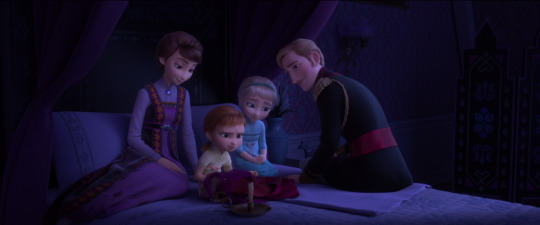
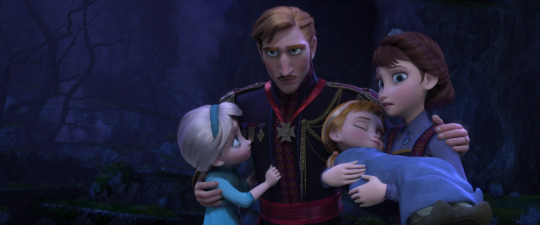
Because the prologue of Frozen 2 is set the same night of the incident that will separate and isolate the Sisters for 13 years.
And the truths Anna & Elsa discover about their parents, about Arendelle and their family heritage place the events of the first movie as an echo of the past:
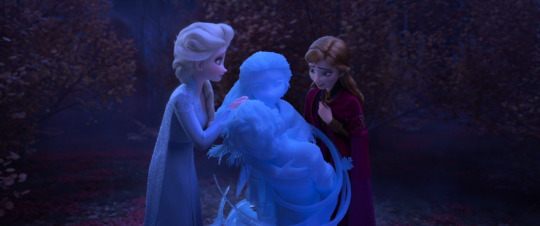
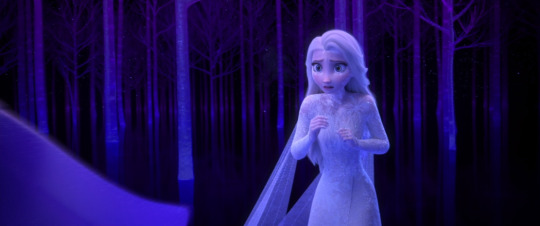
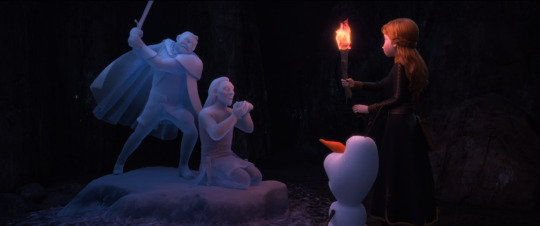
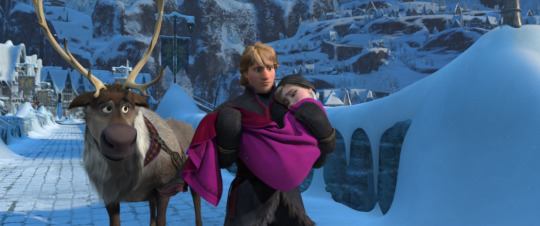
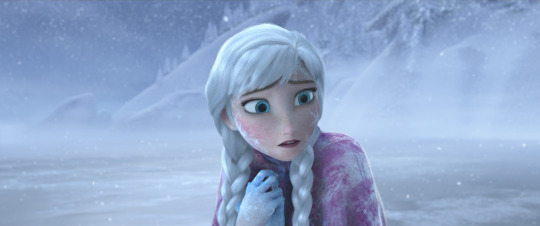
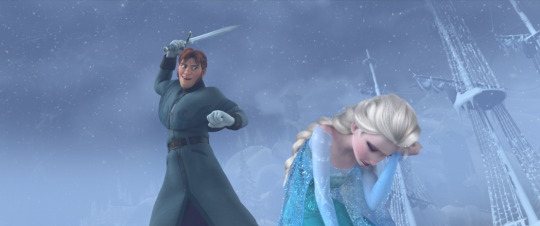
To me, these truths are very important not only because it gives to Anna & Elsa a new path to follow by coming to terms with how those heritages and secrets influenced their own lives (the 13 years Separation), but also maintaining the importance of what they experienced in the first movie.
Here what producer Peter Del Vecho said in 2017 about the development of the sequel:
“Now that we’ve been involved in it for awhile, what’s exciting is it feels like it builds on the first movie. You understand things better in the first movie after you’ve seen the sequel.”
The "understand things better in the first movie" references to Agnarr & Iduna choices for Anna & Elsa, and this is why both sisters can than move on and transform in something new (the new Queen of Arendelle and the Fifth Spirit).
But the revelations of Frozen 2 not only parallelisms to the events of Frozen: they are also considerably related to two things F1 left unresolved about two very specific characters connected to Anna & Elsa present:
While Iduna was a young Northuldra and had to sacrifice her lifestyle and culture to save Prince Agnarr, Kristoff is still, to this very day, that orphan boy who only had Sven by his side, and then they met the Trolls (thanks to the Royal family, I would add);
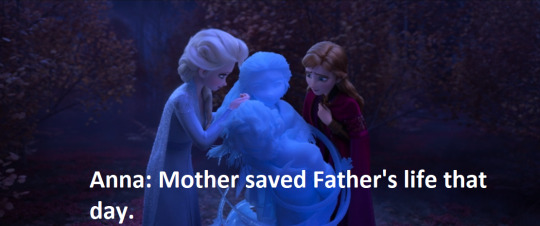
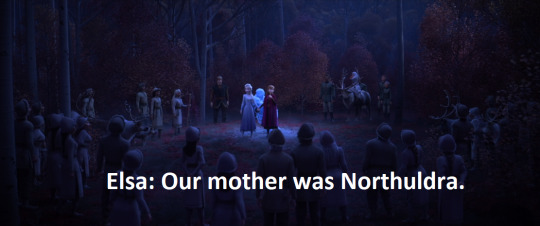
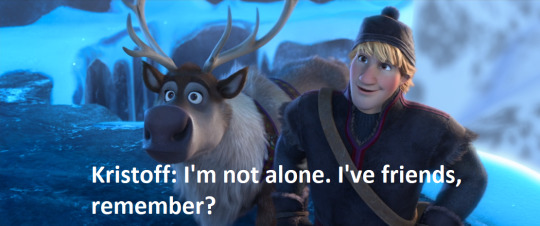
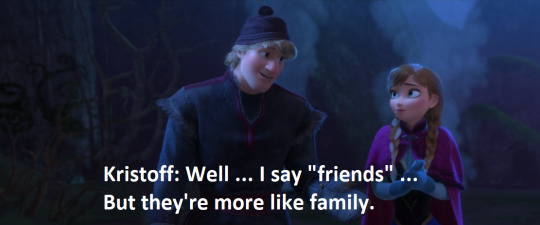
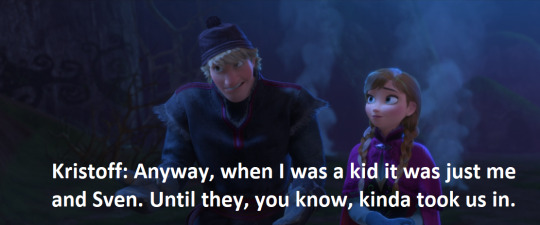
While King Runeard deceived and betrayed the Northuldra because of his hate for magic and his desire to submit them to his rule, Prince Hans still remains a not fully explored stranger, whose family and motivations are still quite uncler, except that he has 12 older brothers in line of succession of the Southern Isles;
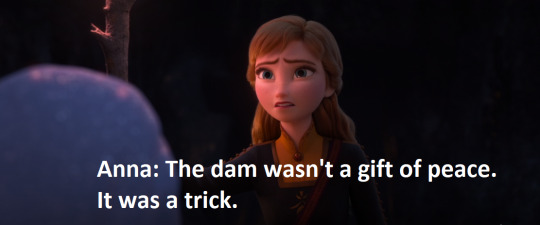
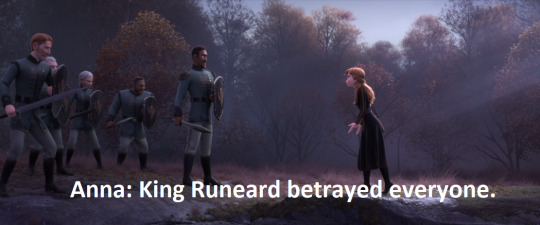
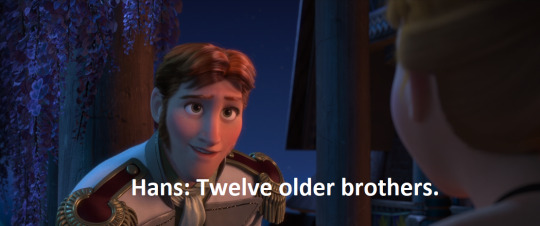
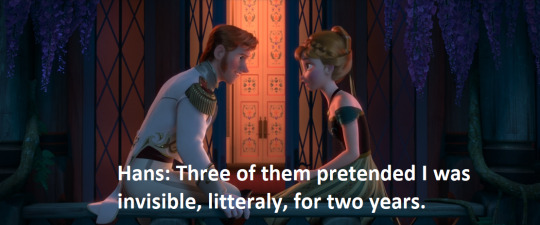
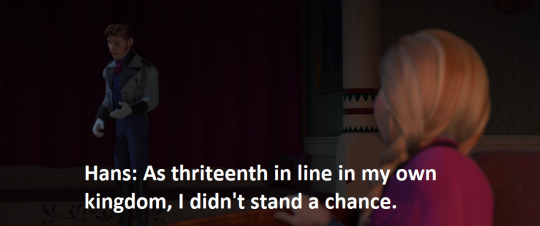
That's the reason why I think that, in order to show Anna and Elsa endurance in this new status quo (their new future), the "new but close element" for them should come from those two (their present), just like in Frozen 2 it came fro Agnarr & Iduna (their past):
Kristoff is not just a Love Interest, and Hans is not just a Villain
But, in order to do that, the Sisters need to leave some space, and that, until know, is something they weren't truely able to do because of how overwhelming their fears and traumas were.
Most importantly, in the Sisters new position, K & H are even less obvious, but more advantaged from a narrative point of view:
Kristoff abandoment issues are something that lies beneath his strong exterior, and "Lost in the Woods" made pretty clear that he needs to openly uknowledge and express what he feels, more importantly now that he's going to (or will, depending on the timeline) marry Anna, the freaking Queen of Arendelle.
Hans complete disappereance from the scene after three years could litteraly mean a lot for him: he could be planning something (but would he really do that?), or he could've actually had enough of searching for a solution and accepted his ultimate fate (or would he still fight destiny in a different way?). One way or the other, he would still be viewed as danger from everyone, most importantly Elsa, who hates him more then everybody else because of what he did to Anna.
Of course, these things are purely personal speculations and theories, but I think it would be kind of odd to completly diverge for other, never heard before and much more complicated things, when even Anna & Elsa "F2 final color schemes" reflect their uniques as individuals in their roles, but also, Anna's black elements in her queen dress bring her closer to Kristoff (and they wear matching outfits), while Elsa white gown as the Fifth Spirit gives that sense of heroic purity that Hans only faked acting as "prince charming" the whole time:
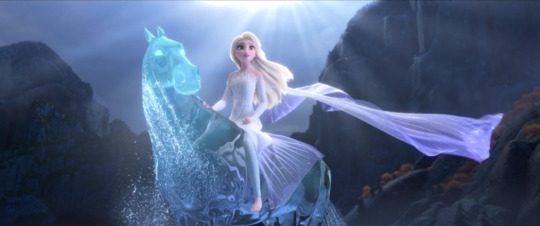
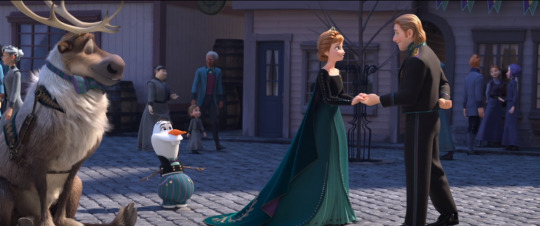
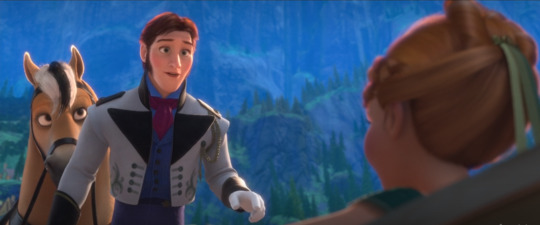
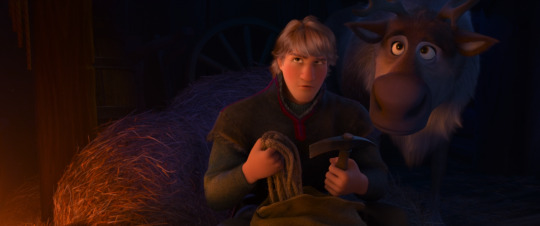
#Frozen#Frozen 2#Frozen 3#Anna#Elsa#Kristoff#Hans#Princess Anna#Queen Anna#Queen Elsa#Snow Queen Elsa#Prince Hans#King Runeard#King Agnarr#Queen Iduna#Agnarr#Iduna#Arendelle#Enchanted Forest#Northuldra#Olaf#Sven#Sitron#Nokk
37 notes
·
View notes
Text
Fate/Zero: Diarmuid, Kayneth, Sola-Ui and Freedom
When I first watched Fate/Zero I loved it. Mostly. The part that struck me as least satisfying was the story of Diarmuid and his Masters Kayneth and Sola-Ui. The love triangle drama was maddening and the cruel, overly gruesome deaths each of them died left a sour taste in my mouth. What was the point of this? How was this fair? How did any of it make sense? The fact that Sola-Ui was charmed by Diarmuid’s love spot into falling for him and leading to her acting without agency was infuriating. The man was perfect, magic wasn’t needed to fall for him!
Over the years, I came to understand bits and pieces of their story in better detail. Obviously it’s meant to mirror and recreate the tale of Diarmuid, Gráinne and Fionn. Legend repeats itself. The next piece is understanding how Diarmuid represents the pure knightly ideal that Arturia is in conflict with between her dual roles and knight and king. He also mirrors Lancelot, whose love affair with Guinevere was based off his own. Two knights, both seeking redemption for their pasts. One by serving again, the other by forcing his king to condemn him. Even if they never meet, they are intrinsically related.
Kayneth also grew on me as I got past his being an asshole and the bait and switch antagonist of the first part. This is a man who is defined by his pedigree in society, who is fighting not for a wish, but to prove that he is superior to raise his status. For him this is just a small step on his road to the highest echelons of society. He has power in his society, but is as much bound by it’s rules as everyone else. If he does not work to be the strongest mage by any means possible, society will leave him behind and the best case scenario will be his death. He’s right to be overconfident by the way, on paper he is the strongest Mage in the Grail War. Unfortunately for him, this isn’t a battle of mages.
His most obvious conflict is with Waver, the battle of Nature Vs Nurture. But he’s also in conflict with Kiritsugu, who is his natural enemy in philosophy and ability. Kiritsugu wishes to tear down the cruel mage society that led to the death of everything he loved, while Kayneth seeks to reinforce it with his power and teachings. Kayneth is also contrasted with Tokiomi. Both are powerful mages, heads of their families and doing what they think is best on the rules of their society to succeed in life. What they’ve been told they need to do. Kayneth is not a good or nice person, but the humanity he gains in his final moments, the spark of understanding of himself and the actions he needs to take to hold on to the last person left in his life, is heart wrenching and tragic.
Lastly, Sola-Ui. She’s by far the most controversial part of this trio. A young woman who is forced to marry Kayneth against her will and falls in love with Diarmuid because of his love spot. She’s portrayed as shallow and cruel when she gets moments and will do anything to be with Diarmuid. She lacks agency and ends up dying a cruel, needless death just so Kiritsugu can wrap up any loose ends. This is meant as a moment to show the lengths Kiritsugu (and Maya) will go to for his philosophy of Utilitarianism, his goal of making a world for his daughter to be happy in and to drive a wedge between him, Saber and Irisviel. But as an ending for Sola-Ui, it stings.
Or at least, it did. I’ve very slowly in recent years come around on the arcs of all three of these characters. The crux of the matter has been coming to terms with Diarmuid’s Love Spot and the curse it inflicts on those around him. It’s kind of absurd as a trait because in myths it wasn’t as effective as it seems in Fate/Zero and he’s already handsome, kind and perfect enough that it’s obvious that young women like Gráinne and Sola-Ui would fall for him. They’re trapped in the expectations of their respective societies that will set them up will older husbands they do not love just for political reasons and then they will lose the little bits of freedom they might’ve had and follow only the roles they had been set to play for the rest of their lives.
But the thing to consider here is that whether the Love Spot is doing anything or not isn’t important. And all evidence points to it being less effective than we’re told by Diarmuid. Firstly, Irisviel and Arturia aren’t effected. The only ones we see who are are Gráinne and Sola-Ui, who it makes perfect sense would fall for him regardless. Secondly, the only have Diarmuid’s word that the Love Spot is working as he thinks it is. This is a man who is wracked with guilt about betraying his oath and whose wish is to have another chance at being a knight. In Fate’s version of his tale we know he also falls for Gráinne and they marry, and he seeks Fionn’s permission to be with her. They have children who he loves, and tragedy only strikes him when Fionn is stuck between holding a grudge or forgiving him and takes too long. Diarmuid says the curse is strong and affecting Sola-Ui because he doesn’t want to consider the possibility of someone else falling for him again, repeating the complicated story of emotions he went through previously. He is single minded in his wish of serving his oath as a knight. If her affection is just a curse, then he can ignore it. To believe that it is working is to buy into the lie Diarmuid is telling himself.
Which brings us back to Sola-Ui.

I think it’s useful here to bring in some flavor text from an FGO craft essence released during the Fate/Accel Zero Order Event. “Young Maiden Ignorant of Love”. It reads:
“The path to reaching the Root seems long and endless.
That's why mages concentrate on prolonging their bloodlines, so that one day their children might achieve their eternal wish.There is no place for individuals.
As it is her heritage and destiny, she has no choice but to follow her family's wish....However, she is not yet aware of the existence of emotions that could overwrite all wishes and destiny.”
Sola-Ui is trapped by the expectations and laws of mage society. She has no freedom beyond the role set for her. To become a mother of a mage child. The only thing she has for herself are her thoughts and feelings. It’s no surprise that she falls for Diarmuid. He’s the perfect knight, and he can save her from the engagement to a monster and give her the freedom she could never have. She falls in love, and this feeling convinces her to do anything for the freedom she now desires. She throws away her role, her wishes and even is willing to be cruel when she sees Diarmuid failing to act to rescue her. She needs to put herself in the position for which she can get his loyalty and love. In that framework Kayneth becomes an obstacle to be removed. The tragedy of her story is that Diarmuid is not in a place to love her, he’s unable to allow himself to give her what she desires. What she needs. He can’t break his oath again.
And that leads to the tragic end of all three characters. Diarmuid refuses to break his oath. Sola-Ui breaks from her role to try to gain her freedom. And Kayneth sacrifices Diarmuid to try to protect the only person he has left in life now that his very life as a mage has been destroyed. All act out of tragic desperation. it’s bitter with no sweetness. But it’s also beautifully earnest to see everyone working to understand their own humanity beyond the shackles society and their stations have imprisoned them with.
I’ve seen comments about how Sola-Ui and the other women in Fate/Zero don’t have agency. And they don’t. Because no one in Fate/Zero has agency. Everyone is trapped by the systems and societies to which they belong. Individuals crushed by the rules that govern the machine of life in which they are just mere cogs. Sola-Ui is an obvious example of this, but Kayneth has just as little freedom. So does Diarmuid. And Kiritsugu. They are all trapped, unable to gain freedom. To seek freedom is to die. And that is the true tragedy of Fate/Zero.
#fate zero#fate/zero#diarmuid ua duibhne#kayneth el-melloi archibald#Sola-ui#I'm sorry i'm not typing out her full name#never happening#i hope it's obvious how much i've come to love all three characters#FGO did a lot for Kayneth during the Zero event
44 notes
·
View notes
Note
Hi! I’d like some advice (it maybe very unusual to say this) but how can I detach my worth from my school grades? I’m going through a medical situation and I have professors that are super supportive and willing to help me. Meanwhile I’ve been dealing with a TA that’s been very rude, off putting and aggressive towards me the whole semester and even opt to have been get paper work to prove I was going through medical complications which disrupted my school work. I usually get good grades but it’s been tough due to what’s going on and she’s been grading my work. Recently she gave me a 70% on a paper I worked so so hard on. I was so devastated because my grade wasn’t that good and this dropped it lower. And it was so odd, I was confused and decided to email her why (I haven’t sent the email yet). I’m super emotional rn because I’ve been forcing myself to keep studying, (through my pain, recovery etc) and she’s been so so unsympathetic and cruel. She has a bad energy about her and she’s a grad student. I am so upset. And I don’t want to be so hard on myself because I did do my best.
Hi love! I'm so sorry to hear that you're going through these medical issues right now. It can't be an easy experience, especially while you're a university student. From what you've written, there seems to be something wrong with this TA's approach and behavior toward you. My suggestion would be to CC your professor on every email to this TA to ensure she takes accountability for her unfair harshness regarding your grades and performance. Having a separate chat with your professor on this matter might also be useful – if this situation isn't resolved without your professor's direct involvement in your conversations with the TA.
On an emotional level, I think one skill everyone needs to learn and internalize as they get older is to not take other people's actions personally unless there's a simple, logical reason as to why your behavior might be met with a harsh or intense reaction (e.g. you made fun of someone's appearance or dreams and they ghosted you, looked angry, or walked away). Most people's actions are a reflection of their inner worlds, how they see themselves, and the circumstances they're currently navigating. While understanding this doesn't resolve many conflicts, it helps you take your emotions out of the situation to assess logically how to best approach the situation. In return, you tend to think more clearly and display a calmer demeanor during a contentious interaction.
Regarding decoupling your academic performance from your self-worth, the best approach I've found (as someone whose clear top priority was my grades as a student, too) is to see your academic performance as a means to an end in pursuit of achieving your longer-term goals. Consider how earning a certain grade affects your future career or lifestyle goals for the first 2-3 years post-grad. If you're applying to a rigorous graduate program, making your grades a top priority makes sense as they will help you to get into the program responsible for helping you get placed in your ideal career (lawyer, doctor, etc.). If you're not planning on earning another degree, think about how well you truly need to do to get the job or experience desired in your chosen field. For the majority of people in the latter camp, having decent marks will not decrease the available opportunities in a given field.
Ultimately, though, making your health your #1 priority will always serve your best interest. Remember: You can always go back to school, retake an exam, or learn a new skill. But, medical-related issues can create chronic or lifelong issues that hinder all future successes or opportunities in certain areas of your life. You can't perform well if you have no energy, mental clarity, or optimal mobility. Choose your well-being. Every time.
Hope this helps. Sending you well wishes and good health xx
#femmefatalevibe#student life#college student#college advice#school advice#femme fatale#dark feminine energy#dark femininity#life skills#life lessons#life advice#it girl#high value woman#the feminine urge#female excellence#dream girl#high value mindset#queen energy#q/a#female power#higher self#healthylifestyle#self help#self healing#healing journey#healthy habits#self love#goal setting
11 notes
·
View notes
Note
I have some ideas for what I would do with Félix, though they need some workshopping. His Season 4 goal would basically be the same, although the background is different.
He is a Sentimonster, and is the only one so far to truly pass the Turing Test as he was made to be a human being from birth/genesis, the others being less than fully sapient. Despite this, he does not like the abuse of Sentimonsters by Shadow Moth and Mayura nor their destruction by Ladybug and Chat Noir, even if most of them are indeed drone constructs. (Or he does not understand that he is the exception to the rule due to limited information.) He does not know that he is a Sentimonster during his debut appearance, instead being told by Amelie at some point after the fact.
I am trying to come up with some background for the rings that would drive Félix to steal Gabriel's for his mother. I'm thinking something magical relating to twins. (Twin rings, twins Emilie and Amelie, Félix would be made for the infertile Amelie (or Colt) as the closest thing to a twin for Adrien.) I haven't yet figured out what the magic actually is.
After learning of his origins, he wants the Peacock Miraculous for himself. After confirming that his uncle is Shadow Moth at the gala in "Gabriel Agreste", Félix returns in the 2-part season finale and makes a deal with Gabriel to become a powerful and dangerous Akuma to steal the Miraculouses in exchange for the Peacock. (Still workshopping how that pans out and leads into the second part.) He is ultimately unsuccessful in acquiring the Peacock as the heroes defeat Shadow Moth and claim both it and the Butterfly Miraculous, and he spends the following season scheming to take the Peacock from Ladybug.
He is still a spiteful jerk like in his debut, to everyone except for his mother.
What do you think? Any ideas to help me fine-tune the plotline?
Honestly the rings don't have to be Magical for Amelie to want them.
In her first appearance where the rings are first mentioned directly, Amelie says that the rings belong to the Graham de Vanily family. With Emilie's 'death', she'd like to have them back with her side of the family instead of Gabriel.
There's even a further hint to this with the movie Solitude. Made by the studio Graham Films, whose logo is a pair of rings.
So yeah the rings belonged to Amelie and Emilie's family. It could be a simple case of just wanting them back for that reason.
11 notes
·
View notes
Text
23. Circus of Wonders, by Elizabeth MacNeal

Owned: No, library
Page count: 369
My summary: Nellie was born with blotches all over her skin, and that makes her a freak in her home village. Unable to marry her off, her father seeks an alternate solution when the circus comes to town. There Nellie meets Jasper Jupiter, the circus’ gregarious and fame-hungry leader, and his younger brother Toby, haunted by something dark in his past. But as Nellie grows to like her new life, trouble is brewing on the horizon. The circus is in trouble. And Jasper will stop at nothing to make his name...
My rating: 3.5/5
My commentary:
Why am I drawn to books about the circus? No, I know the answer to that. There's two answers, actually - one answer is that I read The Night Circus at a formative age, imprinted on the story, and continued to read books that might be like it in an effort to capture the magic, and the other is that books about circuses tend to have themes of being an outsider or outcast from 'normal' society, something I can relate to. This is a more historical novel than the fantasy of The Night Circus, though it does have themes of the fantastical and how fantasy and reality intersect, which are interesting.
Really, though, this is a story about family. Jasper and Toby's power imbalance, Nellie's strained relationship with her birth family and the acceptance she finds at the circus, Pearl's arrival and Nellie's immediate attachment to her - this book is largely about the familial, and what it means to be a family and have family ties. Nellie learns that she wants to continue her career and perform for the rest of her life, but she also wants to be seen as a person, and her birth marks mean that she is viewed as a freak by all but her fellow circus performers. Initially, she wants to run to America with her brother and have a farm; Toby later proposes a similar arrangement with them as a couple, from which she recoils as she realises she prefers her sorority of circus 'freaks'. Toby, meanwhile, has spent a life in his brother's shadow and longs to shine, but a horrible event in their past has rendered him meek and subservient. Jasper is definitely taking advantage of him, but he loves his brother and wants to get their dream circus, even if it seems impossible due to Jasper's lofty ambitions.
The other major theme is greed. Jasper wants to be great, and is willing to throw pretty much everyone in his path under the bus to achieve that goal. He takes out loans and then doesn't pay them back because he's spent all the money expanding. He grows jealous of Nellie's fame, and cuts her out of the show to disastrous effect, finally going into a meltdown when Toby takes over as Jasper Jupiter for a show, cracking and creating metal automatons who don't need to be paid or fed and don't get sick to replace his performers, reasoning that it'll gain him more money. One thing I found interesting about Jasper's descent into avarice is how he isn't completely vilified - sure, he's a terrible person, but the narrative shows his point of view and leads the reader to sympathise with him, and understand why he is the way that he is, which is always interesting in an antagonist. His greed comes out of, initially, desperation, and then a consuming desire for fame that takes over him completely. His descent is honestly chilling.
That's not to say that this book didn't put a foot wrong, however. From the minute the mystery of what happened between Jasper, Toby, and their dead friend Dash in the Crimea is brought up, I guessed exactly what it was, and when it was revealed...yep, I was exactly right. I also wonder about narratives like this that focus on freak show performers but give focus mostly to performers whose bodies are considered more 'normal' by our society (Nellie's birth marks, Toby's tattoos, Pearl's albinism) than those who are not (Stella the bearded lady, the giantess). That's not to say that these characters aren't sympathetic or portrayed with nuance, more that I wonder about the underlying causes of who gets to be a protagonist in these kinds of stories. Overall, though, I really enjoyed it, even if it didn't quite scratch that Night Circus itch for me.
Next up, it's time for something both a little lighter and a little heavier, with a portrait of a relationship.
2 notes
·
View notes
Text
Atlas Shrugged: Part I (2011)
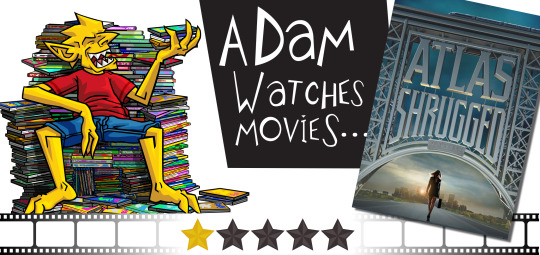
The only thing preventing Atlas Shrugged: Part I from receiving the lower rating it deserves is its audacity. The first two-thirds are impenetrable and boring. The last third clobbers you with so many bewildering developments that when the credits tell you this is only Part I, you want to see what’s coming next. It's hard to believe even a dedicated Ayn Rand fan would like this film, though if they’re as nutty as this movie makes me think they are, they’d probably drop on their knees and worship anything tangentially related to her.
Set in 2016 (5 years after this film was released), gasoline costs $37 a gallon. Railroads are the only economic form of transportation but even they are in rough shape. Dagny Taggart (Taylor Schilling), Vice-President of Taggart Transcontinental railroad, defies her brother, James (Matthew Marsden), the CEO of Taggart Transcontinental, and begins replacing steel rails with Rearden Metal. Named after its inventor, Hank Rearden (Grant Bowler), this new metal is 10 times lighter than steel, but far stronger. Unfortunately, politicians, lobbyists and other industry leaders scheme against Dagny and Taggart; laws are passed forcing them to break up their companies and limit the production of Rearden Metal. The State Science Institute releases a report implying Rearden Metal is dangerous. Despite these obstacles, Hank and Dagny carry on. Meanwhile, talented and hard-working employees are quitting their jobs before disappearing entirely. All of these mysterious disappearances point towards the enigmatic John Galt.
I don’t know much about Ayn Rand or her philosophies. We're only judging this film on its own merit. Unfortunately for Atlas Shrugged, its psychopathic and delusional beliefs are obvious. This film is a contrived roundabout fantasy what-if scenario whose thinly veiled goal is demented. Atlas Shrugged has no idea how crazy it sounds - or perhaps writer John Aglialoro and Brian Patrick O’Toole, along with director Paul Johansson really believe what they’re selling. Everyone is conspiring against Dagny and Rearden. Why? The public is told Rearden Metal is dangerous. How? It doesn’t matter. The point is, people think it’s bad. Railroad workers don’t want to drive on it, everyone expects the bridge made from the adamantium-like substance to crumble. People are scared but our protagonists don’t take the time to dissuade their fears. Instead, they plow forward, cursing those union workers for trying to stand in their way.
Our protagonists hear about a factory whose management tried paying all their staff the same wage. They can’t understand why anyone would even try because all they care about is making money. Rearden admits it, he says “All I care about is making money”. This is our hero. He lives in a world of cartoon characters. His frigid wife hates him and his metal. She practically looks at the Rearden Metal bracelet he gives her as if it was made of tinfoil and dog turds and gets rid of it while he watches. You know it’s so Dagny and Rearden can “fall in love” - or whatever these two reptiles would call love - but you so don’t care. It’s hard to care about anything because the setup is so artificial. It creates this bizarro-world scenario where someone being able to make all the money in the world is a good thing, where someone having a monopoly is desirable, where fairness and competition are the worst things that could happen.
You can tell the people in charge of Atlas Shrugged were so busy padding themselves on the back for "telling the truth" they didn’t stop and think. We can buy that railroads are the only viable means of transportation due to fuel shortages, but the source material clearly took place like 80 years ago. Transporting it to the present day when we have the internet, television, cell phones and solar & nuclear power raises dozens of questions. When Dagny and Rearden leave their office, the streets are littered with “Going out of Business” signs and vandalized cars. People can’t afford anything anymore. Well, “normal” people can’t. These two fat cats are driving all over the country, looking for a mysterious engineer (whose identity you can easily decipher) as if gas doesn’t cost an arm and a leg. Their road trip could've been done over the phone. Even in 2011, audiences must have thought “Couldn’t they prove Rearden Metal is good with TV specials and viral marketing strategies, or a demonstration?”
Over and over, the movie has to contort itself to make this world work. To its credit, it ALMOST does. You don’t understand why Rearden and Dagny are constantly being thwarted so you hate the same people and things they hate. There are split seconds where you actually sympathize with them, which means a lot considering how loathsome their ideals are outside of this very specific scenario.
I wish I could say that Atlas Shrugged: Part I was a fascinating mess but it isn’t even that. So much of it is political wheeling and dealing, a slow burn towards a “romance” you don’t care about or a quest to solve a mystery you could unravel in your sleep you will be bored for most of the picture. It does pick up towards the end, at the point in the story where any other film would wrap up, but this one just starts becoming interesting. That upward climb does make me curious to see what the next part will be like but that’s just me. I doubt anyone reading this would care. (On DVD, March 31, 2023)

#Atlas Shrugged: Part I#Atlas Shrugged#movies#films#movie reviews#film reviews#Paul Johansson#John Aglialoro#Brian Patrick O'Toole#Ayn Rand#Taylor Schilling#Grant Bowler#Matthew Marsden#Edi Gathegi#Graham Beckel#Jsu Garcia#Jon Polito#Michael Lerner#2011 movies#2011 films
1 note
·
View note